Разделы презентаций
- Разное
- Английский язык
- Астрономия
- Алгебра
- Биология
- География
- Геометрия
- Детские презентации
- Информатика
- История
- Литература
- Математика
- Медицина
- Менеджмент
- Музыка
- МХК
- Немецкий язык
- ОБЖ
- Обществознание
- Окружающий мир
- Педагогика
- Русский язык
- Технология
- Физика
- Философия
- Химия
- Шаблоны, картинки для презентаций
- Экология
- Экономика
- Юриспруденция
The Age of Reason
Содержание
- 1. The Age of Reason
- 2. The 18th century in English literature has
- 3. 3 Wars:The war of Spanish Succession (1702—1714)The
- 4. The Age of Turbulence3 revolutions:The Glorious Revolution (1689)The American Revolution (1776)The French Revolution (1789)
- 5. EnlightenmentFrom “Light” The light of
- 6. All men are equal in respect of
- 7. ReligionDeismAtheism
- 8. deism : God was not
- 9. ..leaving human beings the freedom to govern themselves.
- 10. Predecessors:Renaissance Humanists (14th & 15th cent.)The proper
- 11. extension of the Scientific Revolution
- 12. Predecessors:Michel de Montaigne (16th Century)We have no
- 13. Philosophers in EuropeFranceVoltaireDenis DiderotJean Jacques RousseauEnglandJohn LockeThomas Hobbes
- 14. Voltaire François-Marie Arouet
- 15. Denis Diderot (1713 – 1784)
- 16. Слайд 16
- 17. Jean Jacques Rousseau (1712 – 1778) featured
- 18. Voltaire thought Rousseau’s ideas to be a
- 19. John Locke (1632 – 1704) Two Treatises of Government (1689) An Essay concerning Human understanding(1690)
- 20. Thomas Hobbes(1588 – 1679)Leviathan (1651)established social contract theory
- 21. Thomas HobbesJohn LockeHumans are naturally cruel, greedy
- 22. Political Changes in EnglandQueen Anne died without
- 23. George I (1714-1727)The Duke of Hanover
- 24. George II (1727-1760)His reign was marked by
- 25. George III (1760-1801)His reign was marked bythe
- 26. Political & Economic background Wealth from Asia
- 27. a parallel between the golden age of
- 28. the self- conscious imitation of the original
- 29. Life during the Augustan ageA new reading
- 30. Early Newspapers & magazinesAimed at middle class
- 31. Joseph Addison (1672 – 1719) Sir
- 32. 18th Century – The Golden Age of
- 33. Satireevoking toward it attitudes of:AmusementContemptScornor indignationDiffers from
- 34. Style of SatireContains cruel and “dirty” wordsContains
- 35. Weapons of SatireParadoxAntithesisParodyAnticlimaxObscenityViolenceVividnessExaggerationIrony
- 36. Literary TrendsStressed balance, logic, sophisticated wit, and
- 37. Three PeriodsAge of Dryden (Named for John
- 38. Neoclassicism a revival in the seventeenth and
- 39. Alexander Pope (1688-1744)“A little learning is a dangerous thing.”English poet neoclassicistRoman Catholic Self taught
- 40. 3 Periods of his career: 1st
- 41. 3rd PeriodSatires & Epistles of Horace ImitatedThe
- 42. Pope’s poetic styleCoupletsa pair of lines of
- 43. Epigram a short poem with a clever
- 44. DRAMAJohn Gay (1685 – 1731)The Beggar’s Opera
- 45. The rise of the Novel from Italian
- 46. Jonathan Swift (1667-1745) IrishTraveled between Ireland and
- 47. The Battle of the Books (1704)Grew out
- 48. The Battle of the Books (1704)The mock-heroic
- 49. three main themesA satirical view of the
- 50. The Book has 4partsA Voyage to Lilliput
- 51. Jonathan SwiftSwift has sailed into his rest.
- 52. Daniel De-FoeBorn into a middle class family
- 53. De-Foe and the Realist NovelDefoe’s works are
- 54. Roninson CrusoeInspired by the real story of
- 55. Samuel Richardson(1689--1761)The accidental beginning of his literary
- 56. His works:Pamela (1740-1741)Or (Virtue Rewarded, in a
- 57. Henry Fielding(1707--1754)Fielding was a man of extraordinary
- 58. In both theory and practice, Fielding establishes
- 59. Before him, the relating of a story
- 60. Tome JonesAs one of the pioneers of
- 61. Tom Jones is a handsome young man.
- 62. Samuel Johnson or Dr Johnson (1709 –
- 63. The Gothic Novel3. The Gothic novel: the
- 64. Epistolary Novel 4. Epistolary novel: a type
- 65. Sentimentalism5. Sentimentalism: is a literal movement in
- 66. Sentimentalism5. Sentimentalism: is a literal movement in
- 67. William Blake(1757--1827)His life story (Page 283-284)His position
- 68. Robert Burns(1759--1796)His life story (P.P 290--293)The greatest
- 69. Скачать презентанцию
Слайды и текст этой презентации
Слайд 33 Wars:
The war of Spanish Succession (1702—1714)
The war of Austrian
Succession (1740– 1748)
The Seven Years’ War with France (1756 –
1763) The Age of Turbulence
Слайд 4The Age of Turbulence
3 revolutions:
The Glorious Revolution (1689)
The American Revolution
(1776)
The French Revolution (1789)
Слайд 5Enlightenment
From “Light” The light of Reason
People of
the Enlightenment believed human reason could:
~discover the natural laws of
the universe~determine the natural rights of mankind
~ be used to combat ignorance, superstition, and tyranny and to build a better world.
~promote unending progress in knowledge, technical achievement, & moral values
Слайд 6
All men are equal in respect of their rationality
The
tolerance and individual liberty must be granted by the law.
The
Middle Ages - the Ade of Darkness (irrational)
Enlightenment
Слайд 8 deism : God was not so personal. Perhaps, he was
an intelligent human being who wound up the watch and
let events unfold.Слайд 10Predecessors:
Renaissance Humanists
(14th & 15th cent.)
The proper worship of God
involves admiration of his creation (Its crown - humanity)
Celebrating humans
worships God better than preaching original sin and repentanceGalileo Galilei (1632)
Used logic and observation to argue that earth rotates around sun
Led to the advancement of science—Isaac Newton
Слайд 12Predecessors:
Michel de Montaigne
(16th Century)
We have no right to impose
dogmas which rest on cultural habit rather than absolute Truth
Morals
may be relativeIf we cannot be certain that our values are God-given, then we have no right to impose them by force on others
Popes and kings had no right to enforce adherence to particular religious or philosophical beliefs
Doubt is essential to science—test, challenge, ask—to get closer to truth. Authority is science’s enemy
Слайд 13Philosophers in Europe
France
Voltaire
Denis Diderot
Jean Jacques Rousseau
England
John Locke
Thomas Hobbes
Слайд 14Voltaire François-Marie Arouet (1694 – 1778) *Freedom of
Religion
*freedom of expression
*Separation of the Church and the state
Слайд 15Denis Diderot (1713 – 1784) The ENCYCLOPEDIE a set of 17
very large volumes published between 1751 and 1772.
Слайд 17Jean Jacques Rousseau (1712 – 1778) featured an increased focus on subjectivity and
introspection that later characterized modern writing
Слайд 18Voltaire thought Rousseau’s ideas to be a joke—he said “After
I’ve read Rousseau, I feel like I have to get
down on all fours.”Слайд 19John Locke
(1632 – 1704)
Two Treatises of Government (1689)
An Essay concerning
Human understanding
(1690)
Слайд 21Thomas Hobbes
John Locke
Humans are naturally cruel, greedy and selfish.
To escape
this “brutish” life people entered into a social contract.
Only a
powerful government could ensure an orderly society.Only an absolute monarchy could keep a society completely orderly.
Humans are naturally reasonable, moral and good
Humans have natural rights: life liberty and property
People form governments to protect natural rights
Best government was one with limited power
If a government violates people’s natural rights, people have the right to overthrow government
Слайд 22Political Changes in England
Queen Anne died without an heir (1714)
► the end of the Stuart dynasty
Parliament had the
power to decide the future: The Whigs (most MP=power) ► new dynasty
The Tories ► the descendant of King James II
They were called Jacobites (Jacobus=James (Latin))
(attempted two unsuccessful rebellions, 1715 and 1745)
Слайд 23George I (1714-1727)
The Duke of Hanover -
the great-grandson of
James I
Spoke no English (only German)
Relied on the
Whigs to govern.Слайд 24George II (1727-1760)
His reign was marked by the influence of
Sir Horace Walpole
a Whig supporter
the First Prime Minister
remained in power for more than 20 years. lost the election in 1742 and resigned his office.
Слайд 25George III (1760-1801)
His reign was marked by
the American War of
Independence(1776)
the French Revolution.
suffered from mental illnesses later in his
life.Слайд 26Political & Economic background
Wealth from Asia & Americas
►The Rise
of a new class of merchants (Middle Class)
► new ideas
about the world (of the bourgeoisie)The Fall of the Absolute monarchy
Partial displacement of the aristocracy (power in land ownership)
The weakening of the power of the dogmatic church
The new belief that the prosperity is the result of the individual merit and hard work
Rise of a new working class (the result of a series of Enclosure Acts.)
Слайд 27a parallel between the golden age of Latin culture under
emperor Augustus and the reign of Queen Ann (Oliver Goldsmith)
Reasons:
The
victory in the Seven Years’ War (with France) ►Powerful NavyThe wealth of England increased dramatically (trade with the colonies)
Britain’s position as a world power was confirmed
The Augustan age
Слайд 28the self- conscious imitation of the original Augustan writers (Virgil,
Horace)
Return to classical forms : epic, pastoral, satire and Pindaric
Ode, believed that the poet had a social role: to explore the universal human experience and to explore the evils of the society.
Слайд 29Life during the Augustan age
A new reading public: the middle
class►
The rise of Journalism & The rise of the Novel►focus
on the middle class concernsthe advent of coffee from the colonies ►clubs and coffee houses►
intellectual and social centres for debates.
the Scriblerus Club( Pope, Swift, and John Gay )
Слайд 30Early Newspapers & magazines
Aimed at middle class readers
Circulated in coffee-houses
The
editors: Joseph Addison & Richard Steele.
Daily Courant (1702-04)gossips
The Tatler
(1709) mainly essays.The Spectator (1711) politics, literature, art.
Слайд 31Joseph Addison (1672 – 1719) Sir Richard Steele (1672 –
1729)
Collaboration in the periodical essay
Addison – urbane, polished gentleman, exquisite
refinement of taste & lofty ideas of rectitude & piety but shy, Self-conscious, a little remote & austereSteele – Bohemian, easygoing, Thriftless, careless but full of generosity & sympathy & an honest love of what is pure & good
Слайд 3218th Century – The Golden Age of Satire
A literary technique
that mixes criticism with humor
Uses laughter as a weapon, usually
to encourage social reformSatire
Слайд 33Satire
evoking toward it attitudes of:
Amusement
Contempt
Scorn
or indignation
Differs from comic:
Comic evokes laughter
Satiritist:
Uses
laughter as weapon against:
An individual
A type of person
A class
An institution
A
nationHuman nature itself
Among other
Слайд 34Style of Satire
Contains cruel and “dirty” words
Contains comic words and
terms
Uses conversational and non-literary language
Tries to produce the unexpected
Слайд 35Weapons of Satire
Paradox
Antithesis
Parody
Anticlimax
Obscenity
Violence
Vividness
Exaggeration
Irony
Слайд 36Literary Trends
Stressed balance, logic, sophisticated wit, and emotional restraint
Neoclassicism
Birth of
the novel (Realism)
Sentimentalism
Pre- Romanticism (toward the end of the period
in poetry)Слайд 37Three Periods
Age of Dryden (Named for John Dryden)
Age of Pope
and Swift
Heavy Neoclassic style
Age of Johnson
Beginnings of a shift
toward RomanticismСлайд 38Neoclassicism
a revival in the seventeenth and eighteenth centuries of
classical standards of order, logic, proportion, restrained emotion, accuracy, good
taste and decorum in literature.Alexander Pope, John Dryden and Samuel Johnson
artistic models:
classical literature ( Homer, Virgil, Horace, etc.)
French writers (Voltaire, Diderot)
+ Horace’s Ars Poetica & Boileau’s L’Art Poetique
Слайд 39Alexander Pope (1688-1744)
“A little learning is a dangerous thing.”
English poet
neoclassicist
Roman Catholic
Self taught
Слайд 40
3 Periods of his career:
1st period
Four Pastorals – Vergil
immitation
Windsor Forest
The essay on criticism
The Rape of The Lock –
a mock epic poem 2nd period
The Translation of the Iliad & the Odyssey
Слайд 413rd Period
Satires & Epistles of Horace Imitated
The Dunciad – a
long & elobrate satire on the ‘Dunces” – the bad
Poets, Pedants & Pretentious critics of the dayThe Essay on man – a poem in four Epistles
Defence of the moral government of the universe & an explanation of the physical & moral evil
Evil is simply part of God’s plan.
“Whatever is, is right”
Слайд 42Pope’s poetic style
Couplets
a pair of lines of verse which consists
of two lines that usually rhyme and have the same
meterIambic Pentameter
has an unrhymed line with 5 iambs or feet. Iambic means the stress is on the second syllable, an Pentameter shows us that a line has 5 feet or clusters of two syllables adding up to 10 syllables a line.
Heroic Couplets
A pair of rhymed iambic pentameter lines that reach completion in structure and in sense at the end of the second line.
Слайд 43Epigram
a short poem with a clever twist at the end
or a concise and witty statement.
Here lies my wife:
here let her lie! Now she's at rest — and so am I.
John Dryden
I am His Highness' dog at Kew;
Pray tell me, sir, whose dog are you?
Alexander Pope
Слайд 44DRAMA
John Gay (1685 – 1731)
The Beggar’s Opera (1728)
satire towards
Italian opera
George Lillo (1693 – 1739)
London Merchant or History of
George BarnwellFatal Curiosity – domestic drama or form of tragedy – Incidents were taken from common life instead of from history or romance
Слайд 45The rise of the Novel
from Italian “novella” = a
long prose narrative.
Period of experimentation → no dominant form
Defoe ►
the Realist NovelSwift ► the philosophical novel
Richardson ► the Sentimental Novel/ Epistolary Novel
Fielding ► the Comic Novel
Sterne ► the sentemental Novel.
Слайд 46Jonathan Swift (1667-1745)
Irish
Traveled between Ireland and England
Fought hard for
the Irish
Anglican priest
Pessimistic view of human nature
Слайд 47The Battle of the Books (1704)
Grew out of a controversy
in which sir william tample had taken prominent part
The respective
merits of ancient & Modern LitThe mock-heroic description of the great battle in the King’s Library between the rivals hosts
A Tale of a Tub (1704)
It contains the essence of his thought & style
Designed to champion the protestant church against the pretensions of the church of Rome & the extravagances of the dissenting sects, & to exhibit the corruptions of modern christianity
An allegorical story
Principal figure – 3 brothers – Peter (The Roman church) , Martin (The English Church), Jack (The Calvinists or dissenters)
Слайд 48The Battle of the Books (1704)
The mock-heroic description of the
great battle in the King’s Library between the rivals hosts
A
Tale of a Tub (1704) the corruptions of modern Christianity
An allegorical story
Principal figure – 3 brothers – Peter (The Roman church) , Martin (The English Church), Jack (The Calvinists or dissenters)
The Modest Proposal (
Gulliver’s Travels (1728)
Main Works
Слайд 49
three main themes
A satirical view of the state of European
government, and of differences between religions
An inquiry into whether men
are inherently corrupt or whether they become corruptedA restatement of the older "ancients versus moderns" controversy
Gulliver’s Travels (1728)
Слайд 50The Book has 4parts
A Voyage to Lilliput – the
English politics of the Time
A Voyage to Brobdingnag
A Voyage
to Laputa, Balnibarbi, Luggnagg, Glubbdubdrib, and Japanattacks Philosophers & Inventors who waste their energies in the pursuit of visionary & fantastic things
A Voyage to the country of the Houyhnhnms & Yahoos “ – ‘that animal called man”
Слайд 51Jonathan Swift
Swift has sailed into his rest.
Savage indignation there
cannot lacerate his breast.
Imitate him if you dare,
world-besotted
traveler. He served human liberty.
Слайд 52Daniel De-Foe
Born into a middle class family of Dissenters.
Educated at
a Dissenting Academy.
Merchant and interest in politics.
Journalist (correspondent) contribution
to contemporary newspaper: editorial & interview1719 Robinson Crusoe a sailorman who was deserted at an uninhabited island in the Pacific Ocean
1722 Moll Flanders → poor girl seduced by a rich man, forced to become a prostitute and a thief, managesi n the end to lead a respectable life, repenting for her sins..
Слайд 53De-Foe and the Realist Novel
Defoe’s works are written in the
form of fictional autobiography or diary to make them more
realistic.The protagonist must struggle to overcome a series of misfortunes, using only his/her phisical or mental resources.
No psychological development of characters.
Слайд 54Roninson Crusoe
Inspired by the real story of Alxander Selkirk
Divided into
3 sections
Hero of the middle class → values of hard
work, self improvement, belief in God’s providence.Interpreted as a religious allegory → redemption from sins through hard work
Economic Allegory of merchant capitalism
Imperialist allegory (more recently) → of the British Colonizer who is convinced of hi superiority over the savage.
Слайд 55Samuel Richardson(1689--1761)
The accidental beginning of his literary career came in
1739 when, at the age of 51, Richardson was asked
by two bookseller friends to compile a volume of model letters for people without much formal education to practice in their correspondence. Richardson intended that his manual should not only teach people how to write letters but also be morally instructive. He was duly rewarded for his kindness and the pain he had taken for the composition of such moving letters.Слайд 56His works:
Pamela (1740-1741)
Or (Virtue Rewarded, in a Series of Familiar
Letters from a Beautiful Young Damsel to Her Parents)
Clarissa Harlowe
(1747)Or: Virtue Triumphant
Sir Charles Grandison (1753-1754)
He wrote only three novels, all in epistolary form.
Слайд 57Henry Fielding(1707--1754)
Fielding was a man of extraordinary vitality and capacity.
He was a dramatist, an essayist and a novelist. His
fame is established chiefly upon his success as a novelist. Joseph Andrews (1742), his first novel .The History of Jonathan Wild the Great (1743)
The History of Tome Jones, A Foundling (1749) , his masterpiece.
Слайд 58In both theory and practice, Fielding establishes once and for
all the from of the English novel. He has held
a unique position in the history of English literature by being called the “father of the English novel”, for his contribution to the establishment of the form of modern novel. Fielding set up the theory of realism in literary creation. He wrote specifically "comic epic in prose", the first to give the modern novel its structure and style.Слайд 59Before him, the relating of a story in a novel
was either in the epistolary form (a series of letters)
as in Richardson's Pamela, or the picaresque form (adventurous wanderings ) through the mouth of the principal character, as in Defoe's Robinson Crusoe, but Fielding adopted "the third-person narration". In planning his stories, he tries to retain the grand epical form of the classical works but at the same time keeps faithful to his realistic presentation of the common life as it is.Слайд 60Tome Jones
As one of the pioneers of English realistic literature,
Fielding portrays the real life of men without disguise. He
exposes the hypocrisy and depravity of the ruling class, and pictures the poverty of the working masses who are driven by want to crime. For a time, Tom became a national hero. People were fond of this young fellow with manly virtues and yet not without fault. The full-blooded characters are realistically depicted in brilliant, witty and highly artistic language.Слайд 61Tom Jones is a handsome young man. He is frank
and open. His outstanding quality is "good nature" and "goodness
of heart". He is never an indifferent spectator of the misery or happiness of anyone. He would not willingly inflict even the most trifling harm on anybody. Yet Tom is very far from being a model character. He lives by impulse, not by reason. The most serious mistake that Tom commits is his liaison with Lady Bellaston after his arrival in London. A simple country boy thoroughly ignorant of the ways of the depraved high society in London, he is completely taken by surprise by a bad woman and becomes, for a short time , her paid lover. But as soon as he learns the true character of the woman , he immediately terminates the connection.Слайд 62Samuel Johnson or Dr Johnson (1709 – 1784)
the
‘literature dictator’ known from The Life of Johnson (biography),
written by James Boswell.the first compiler of the most complete English dictionary:
A Dictionary of the English Language (1755)
Слайд 63The Gothic Novel
3. The Gothic novel: the novel which exploits
the possibilities of mystery and terror in gloomy landscapes, decaying
mansions with dark dungeons, secret passages, instruments of torture, ghostly visitations ghostly music behind which lurks no one knows what as the central story, the persecution of a beautiful maiden by an obsessed and haggard villain. The real originator of English Gothic novel was Horace Walpole, with his famous Castle of Otranto (1764) .These novels rebel against the increasing commercialism and rationalism opened up to later fiction the dark, irrational side of human nature.
Слайд 64Epistolary Novel
4. Epistolary novel: a type of nnovel in
which the narrative is carried on by means of series
of letters. Samuel Richardson’s Pamela (1740) and Clarissa Harlowe (1748) are among the best known epistolary novels.It can be classified into two kinds: the monologue epistolary novel and the dialogue epistolary novel
Слайд 65Sentimentalism
5. Sentimentalism: is a literal movement in the middle of
the 18th century in England which concentrates on the distressed
of the poor unfortunate and virtuous people and demonstrates that effusive emotion was evidence of kindness and goodness. It reveals grief, pains and tears. The representatives are Laurence Sterne who wrote A Sentimental Journey through France and Italy (1768) and Oliver Goldsmith who wrote The Vicar of Wakefield (1766).It came into being as a result of a better discontent on the part of certain enlighteners in social reality.
Слайд 66Sentimentalism
5. Sentimentalism: is a literal movement in the middle of
the 18th century in England which concentrates on the distressed
of the poor unfortunate and virtuous people and demonstrates that effusive emotion was evidence of kindness and goodness. It reveals grief, pains and tears. The representatives are Laurence Sterne who wrote A Sentimental Journey through France and Italy (1768) and Oliver Goldsmith who wrote The Vicar of Wakefield (1766).It came into being as a result of a better discontent on the part of certain enlighteners in social reality.
Слайд 67William Blake(1757--1827)
His life story (Page 283-284)
His position in English literature:
the representative of pre-romanticist.
His main works:
Songs of Innocence (1789)
The
Marriage of Heaven and Hell(1790)Songs of Experience (1794)
Appreciate the poem London on P.287
Слайд 68Robert Burns(1759--1796)
His life story (P.P 290--293)
The greatest of the 18th
century Scots poet.
His works:
Poems, Chiefly in the Scottish
DialectThe Tree of Liberty
My Heart’s in the Highland (Page 294)
A Red, Red Rose (Page 295)
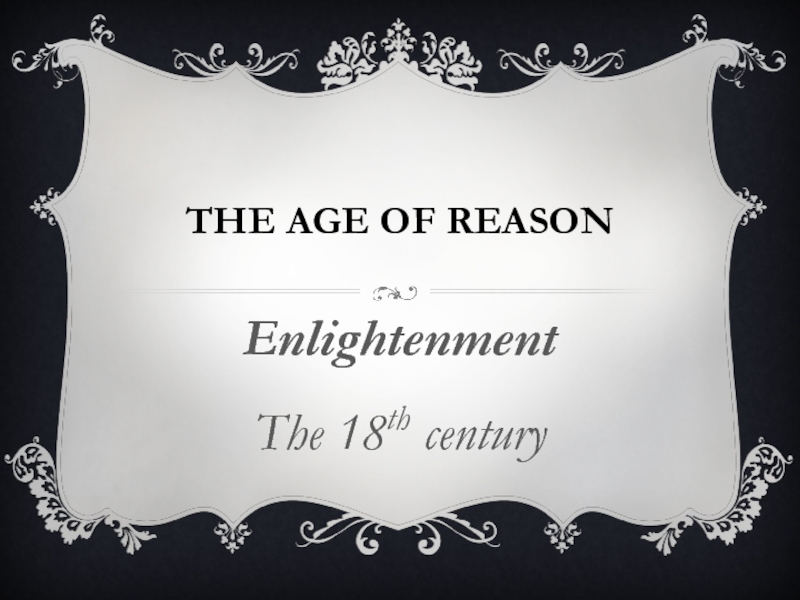
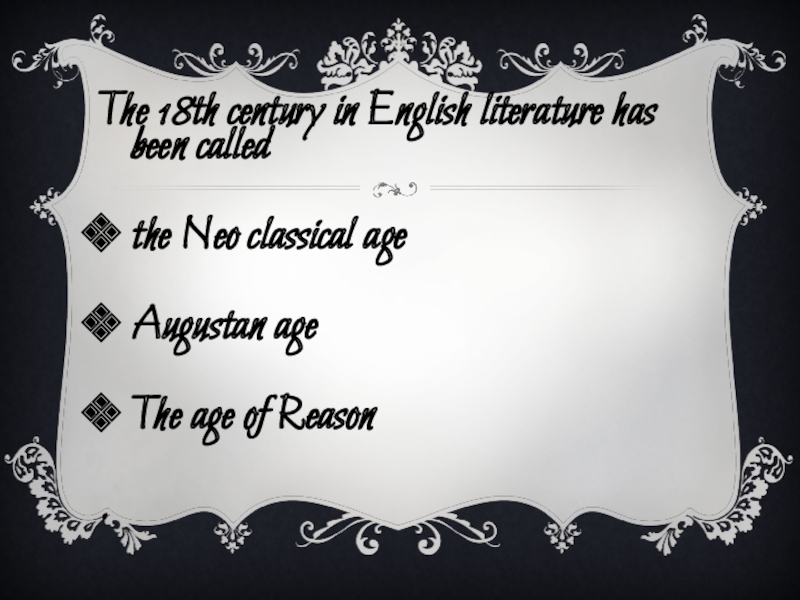
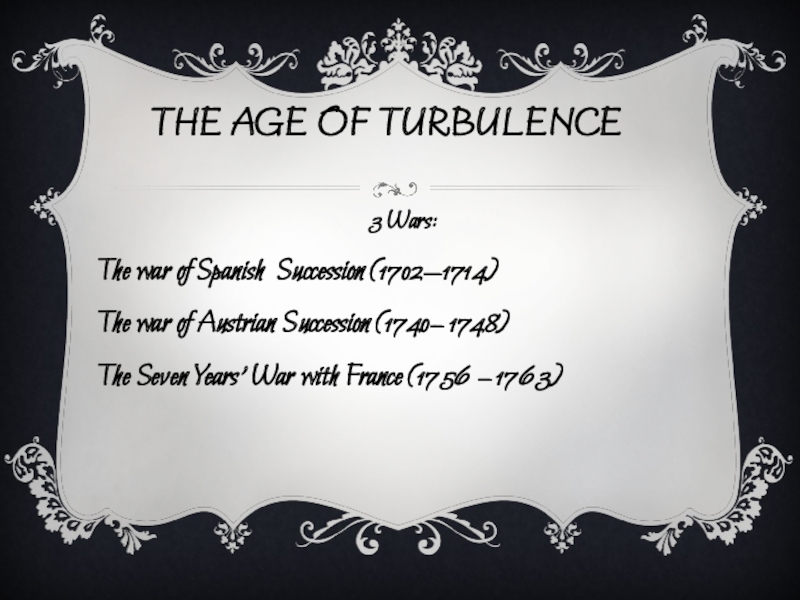
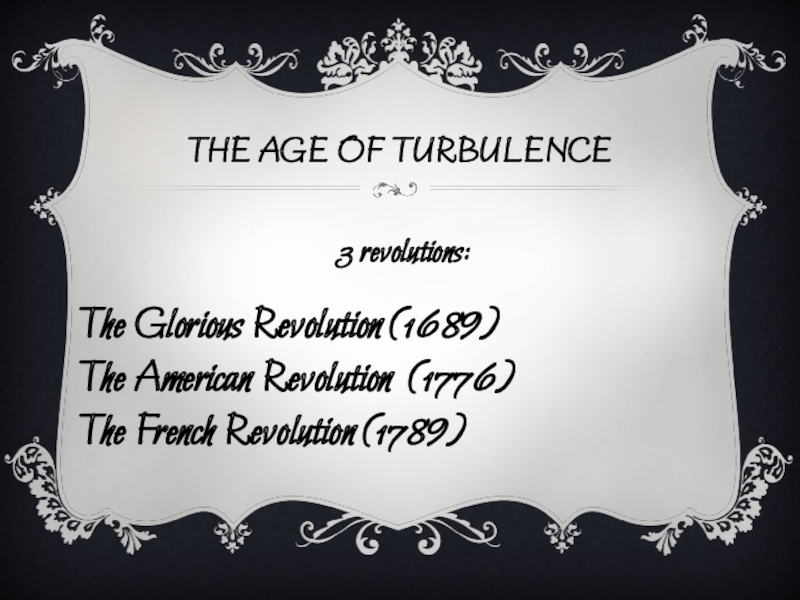
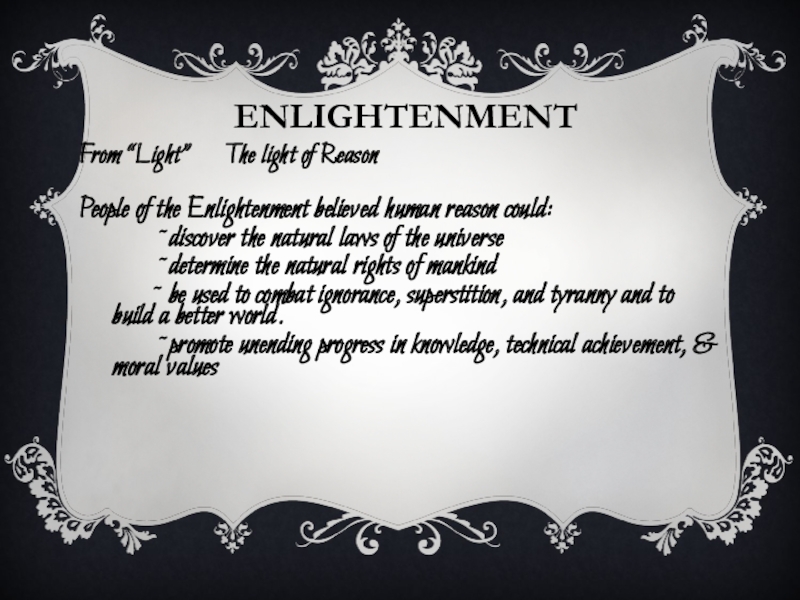
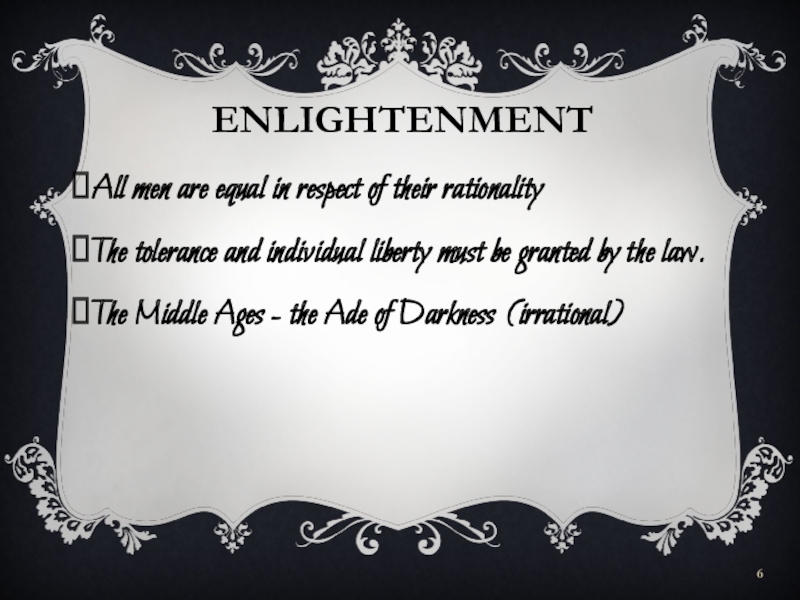
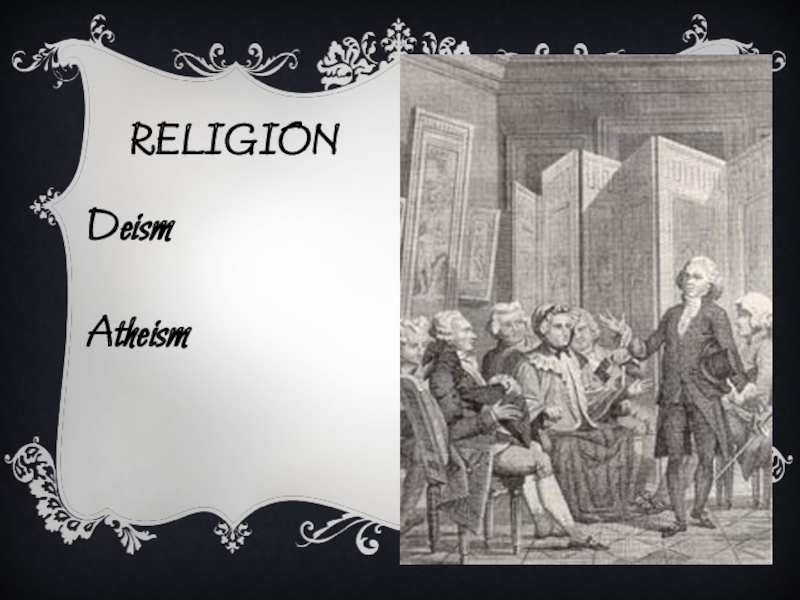
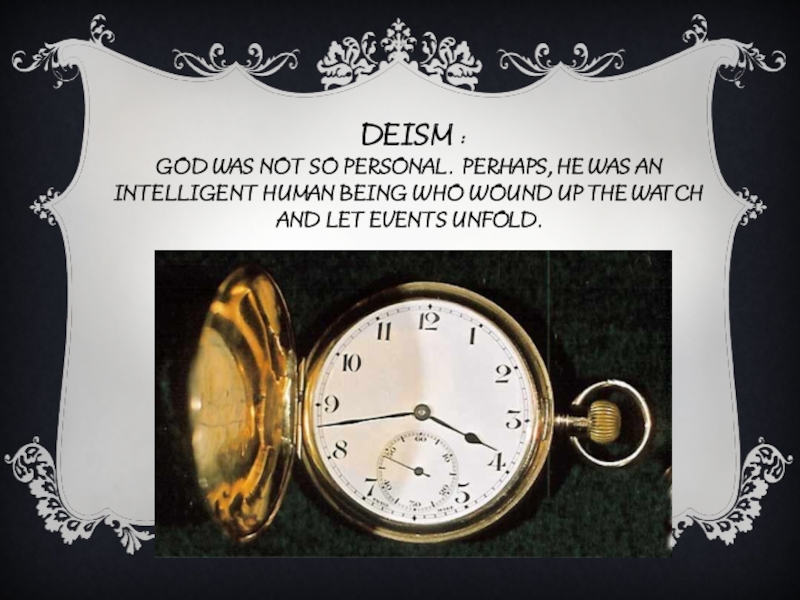
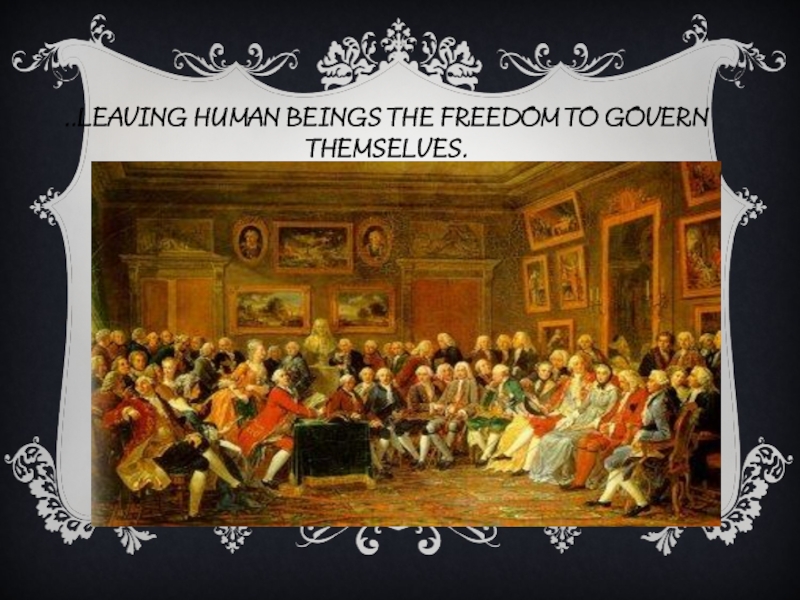
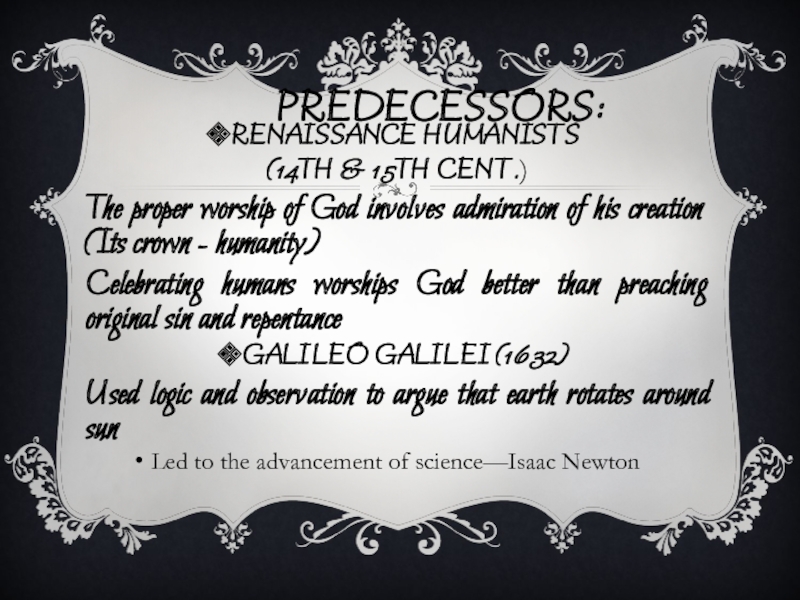
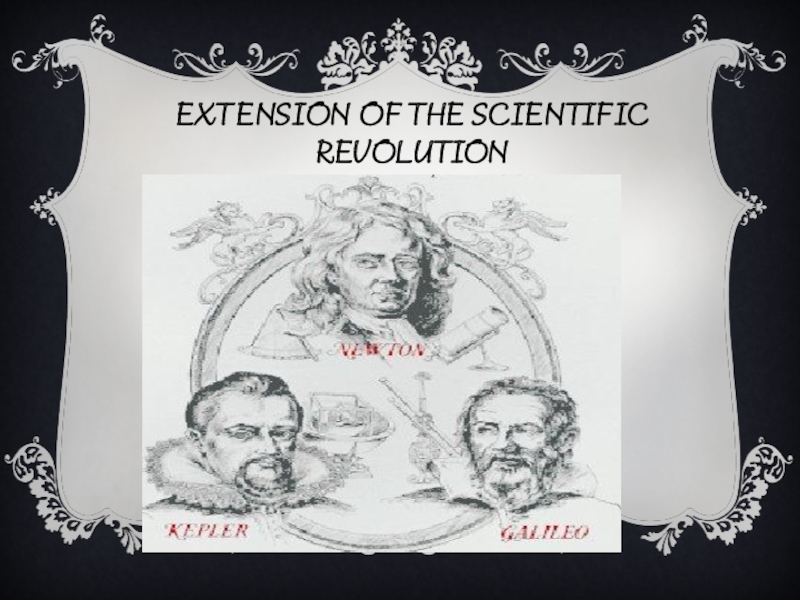
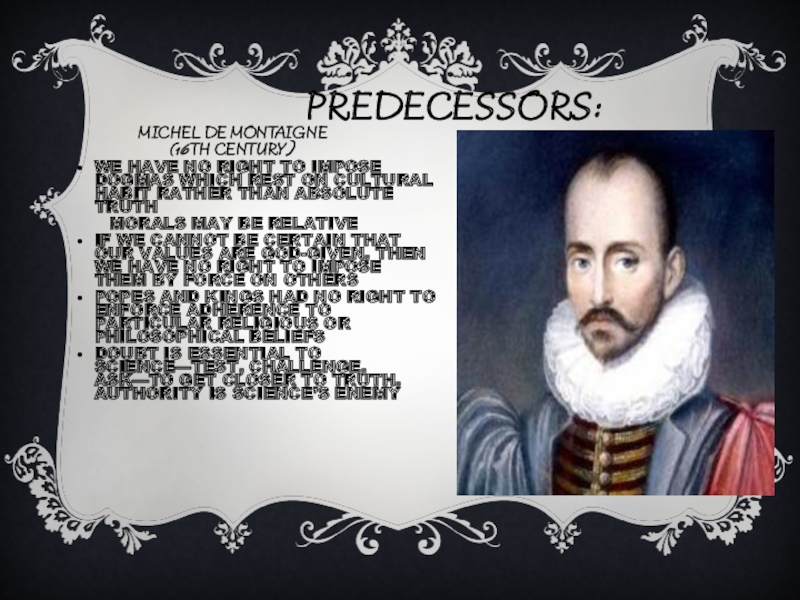
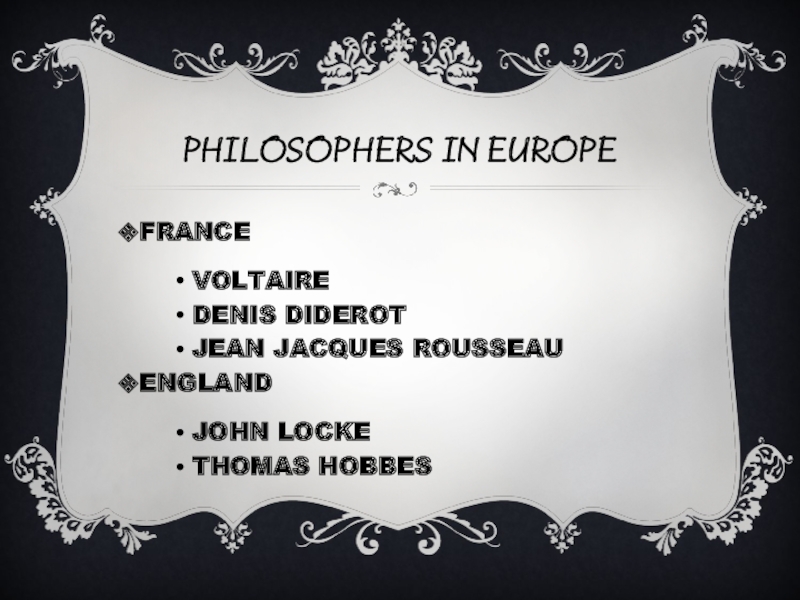
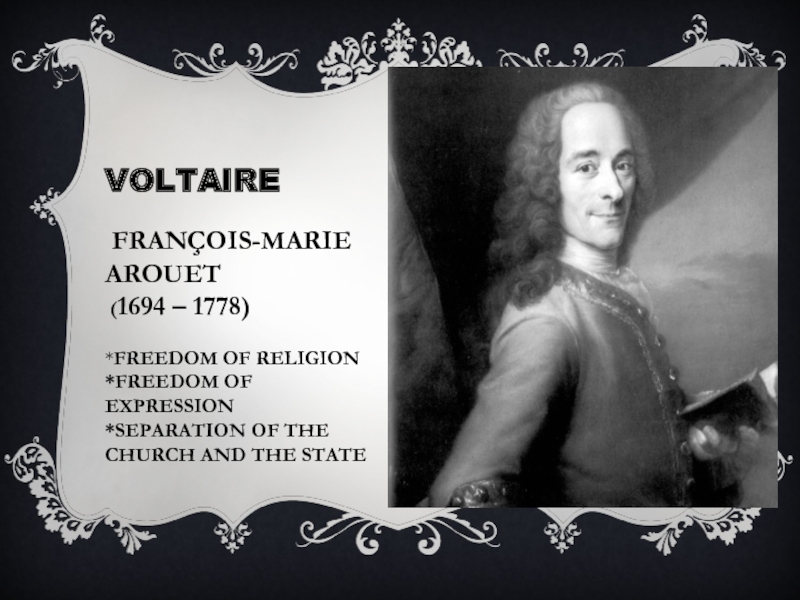
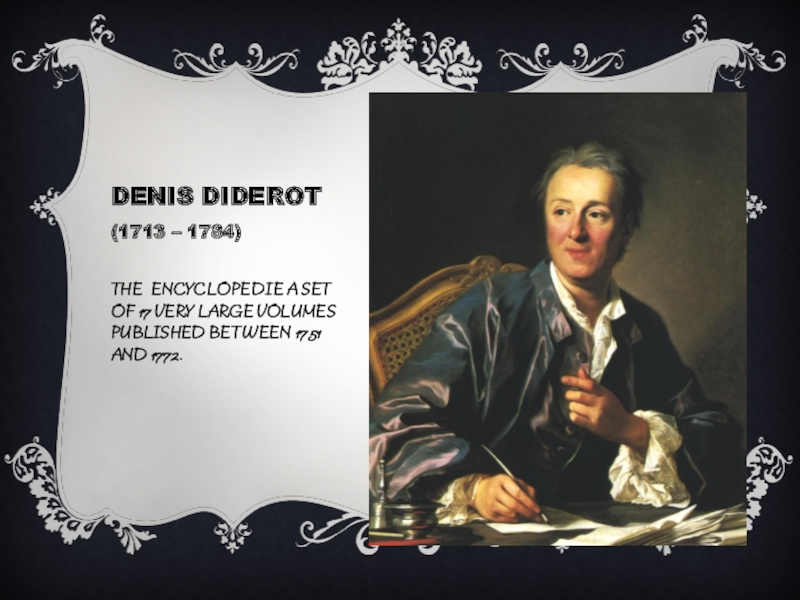
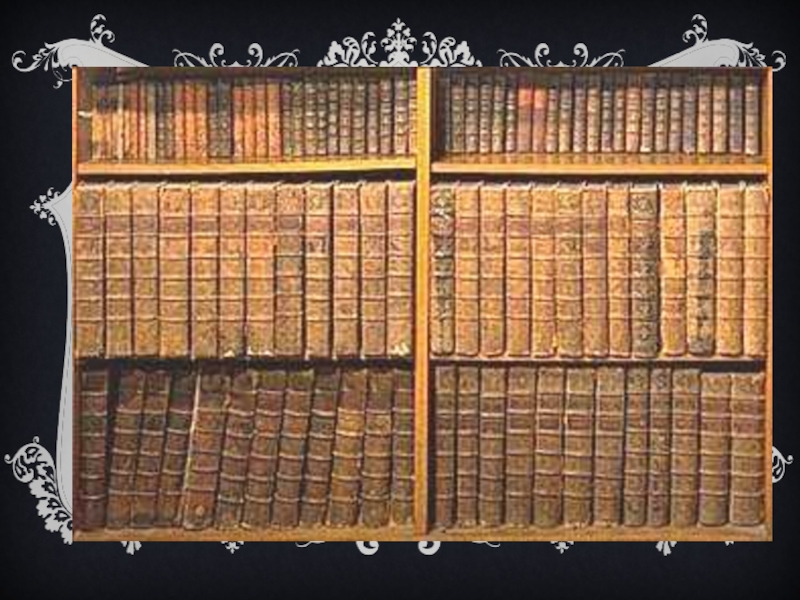
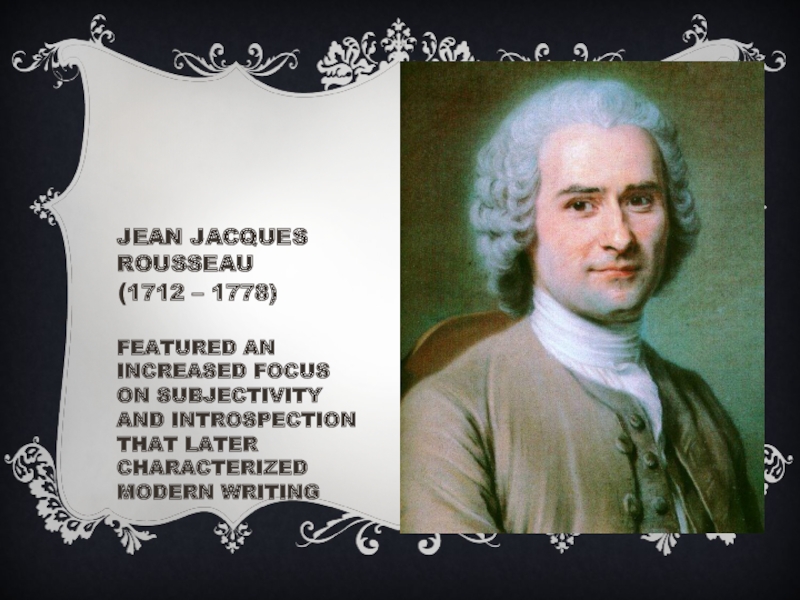
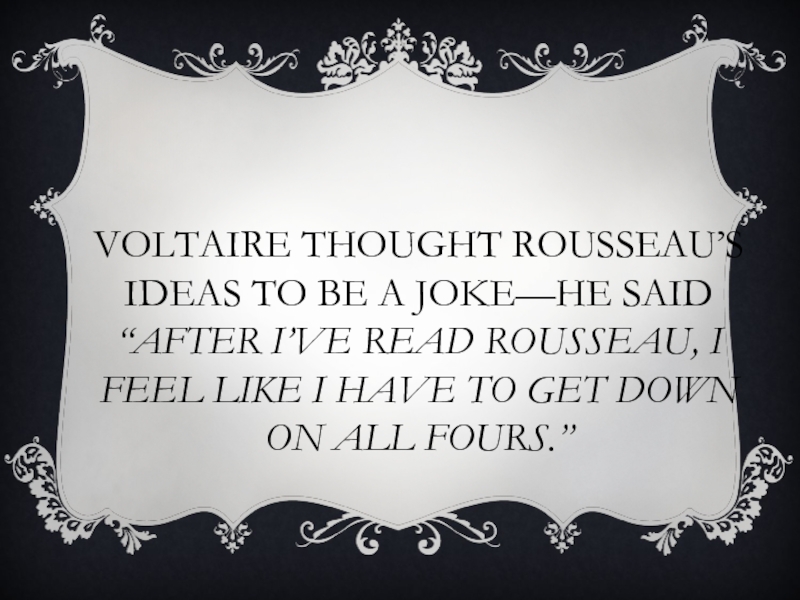
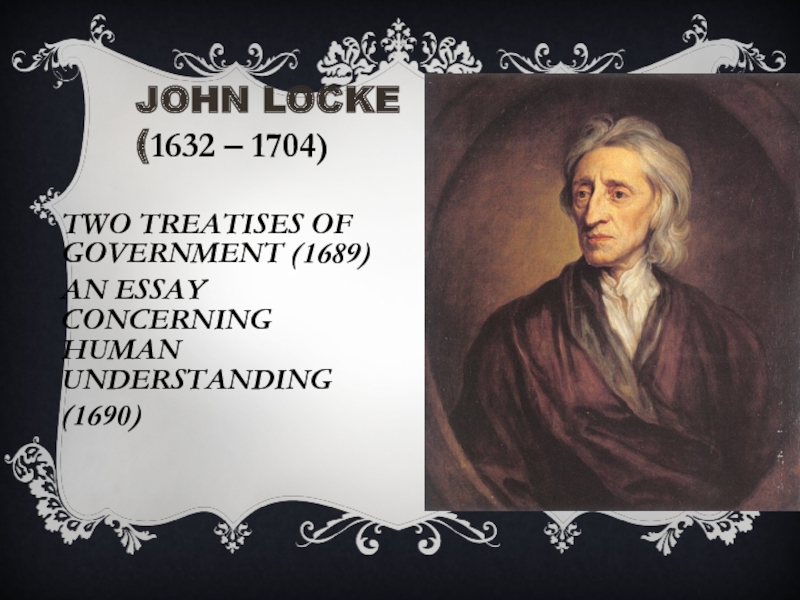
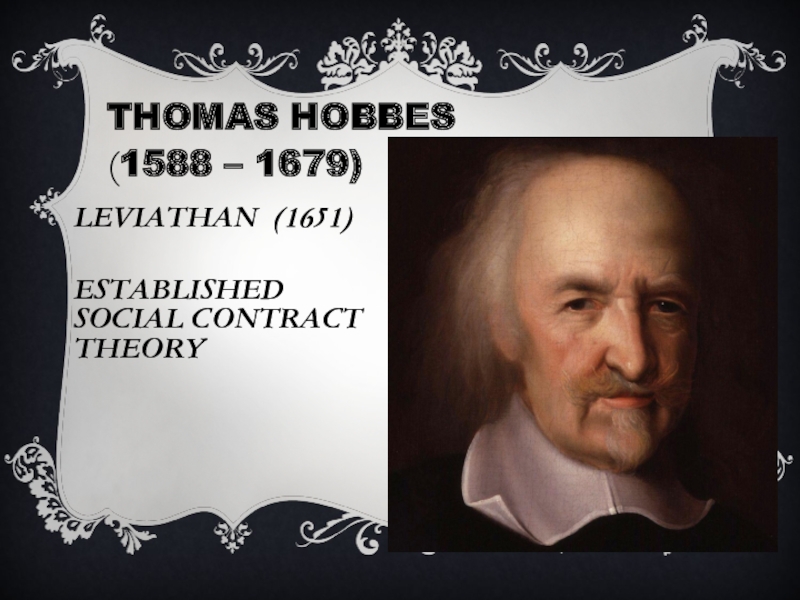
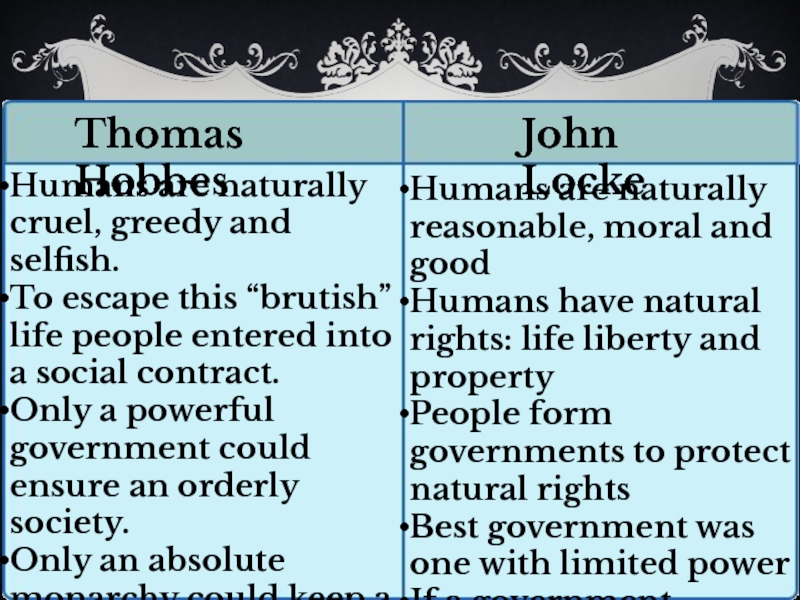
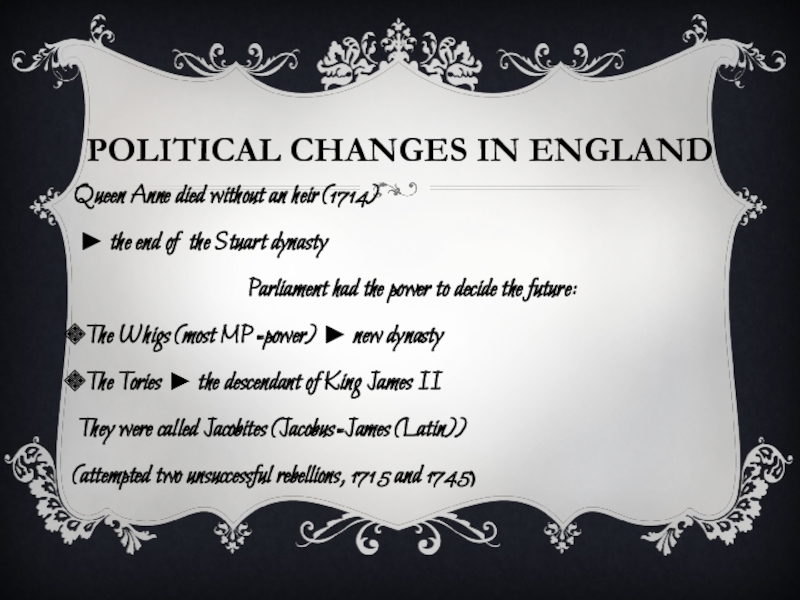
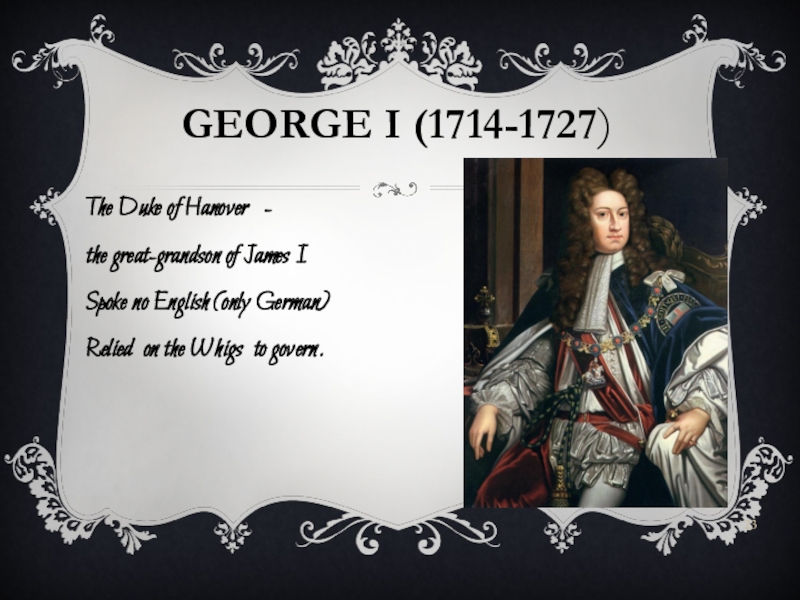
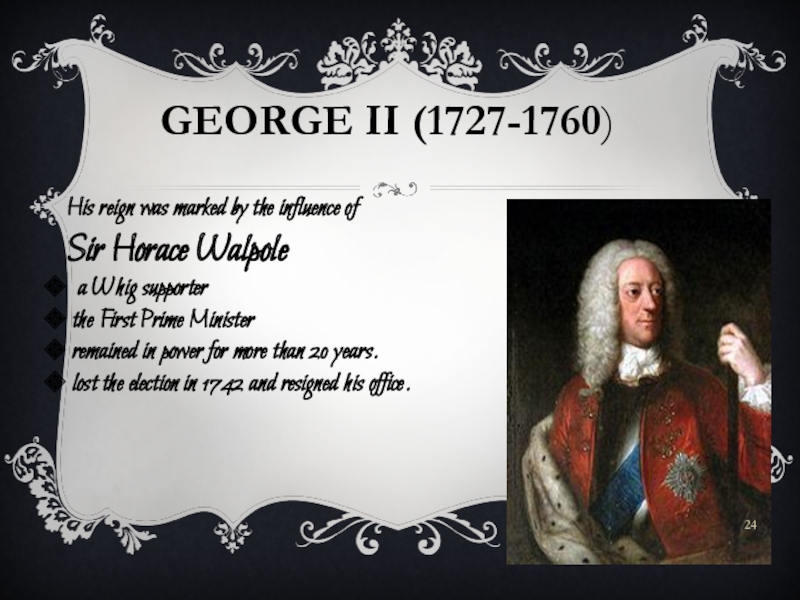
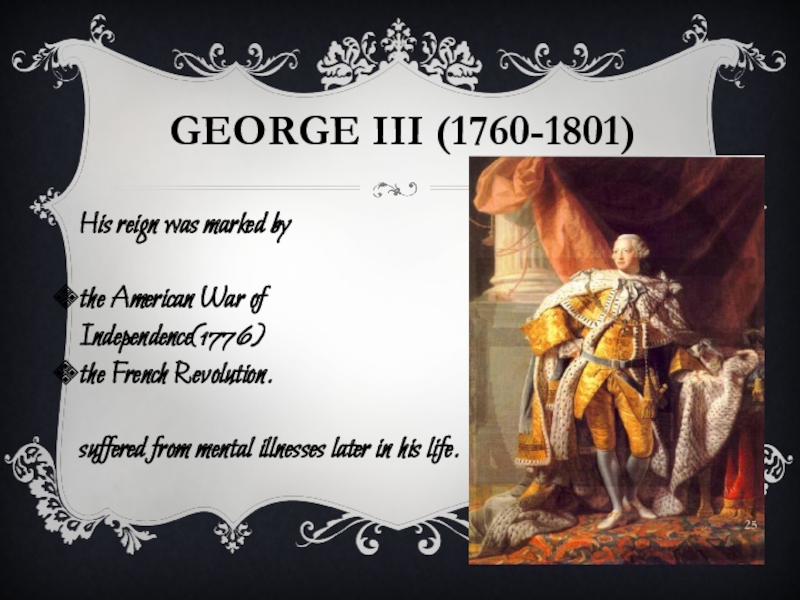
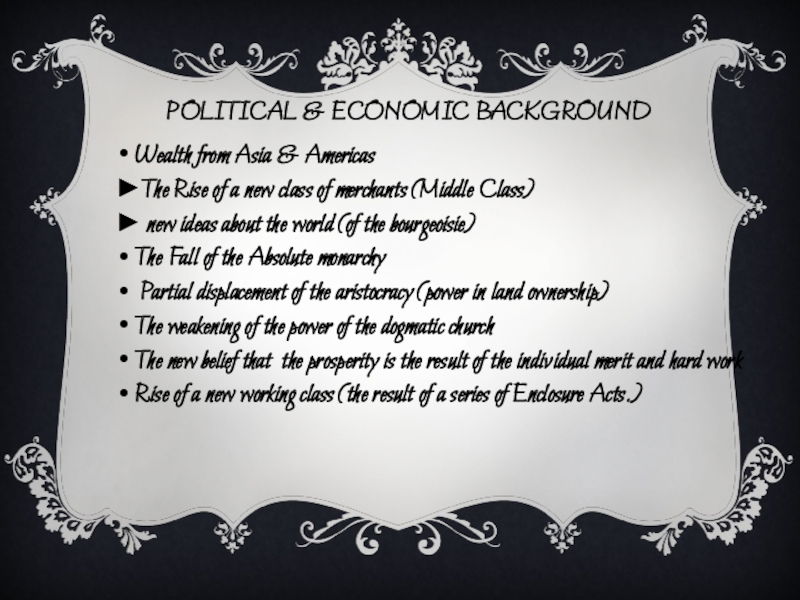
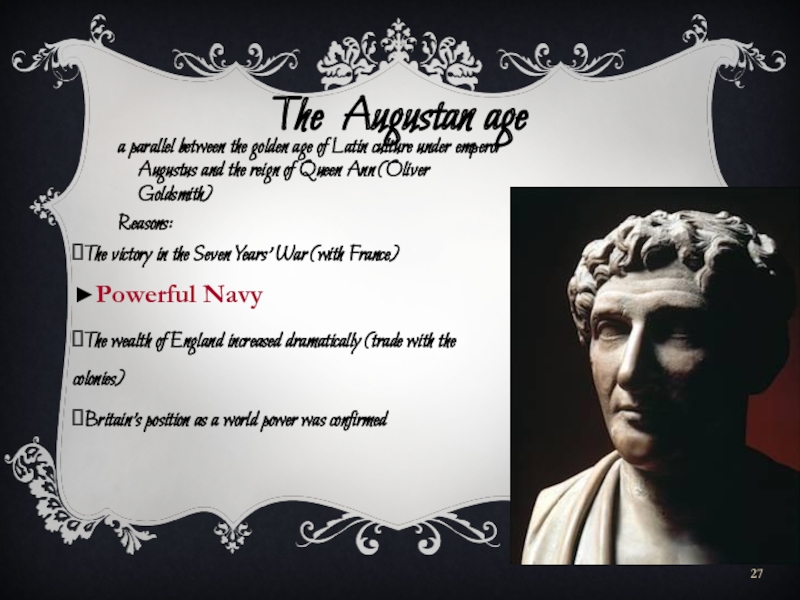
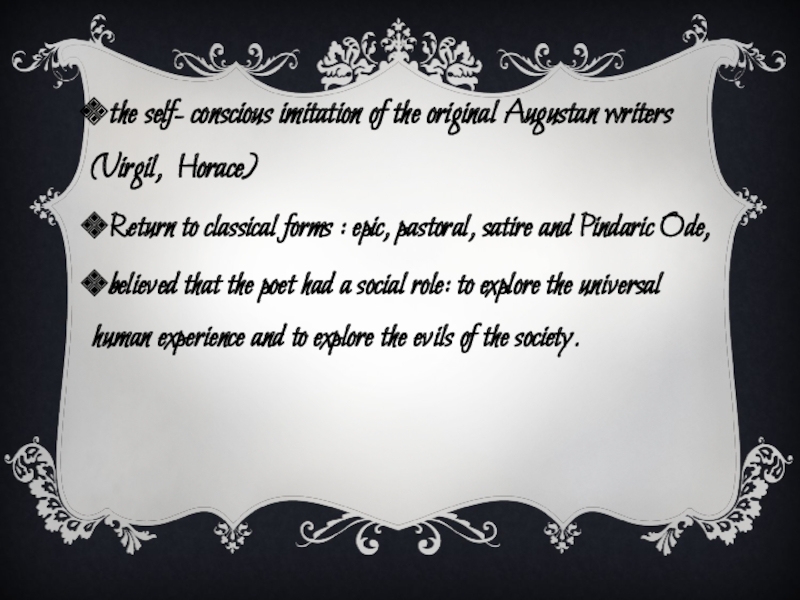
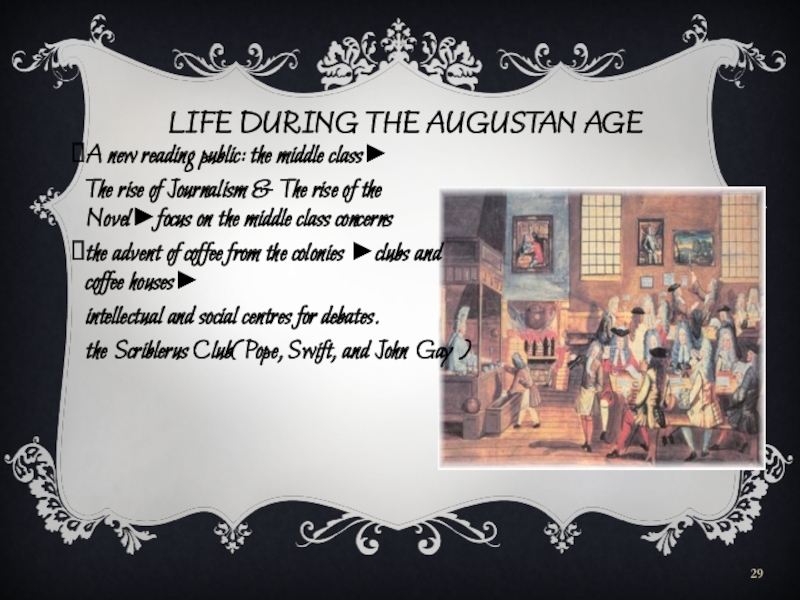
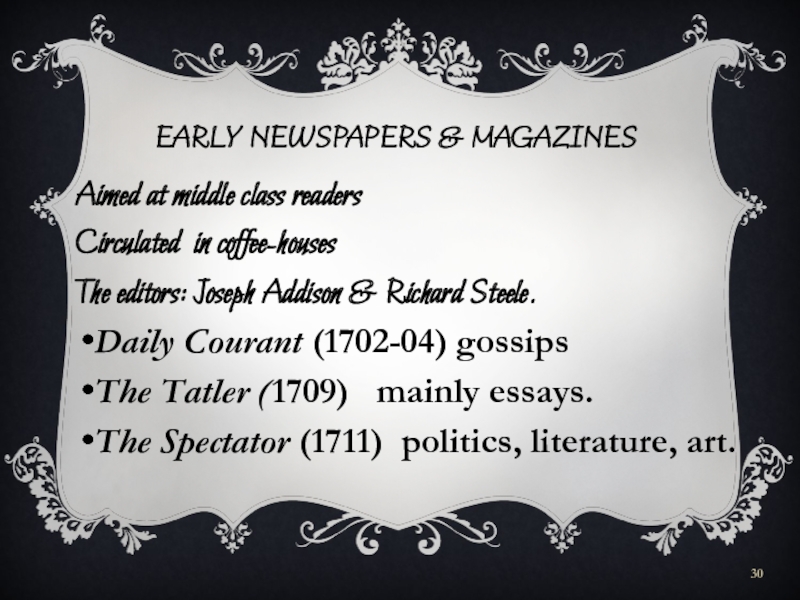
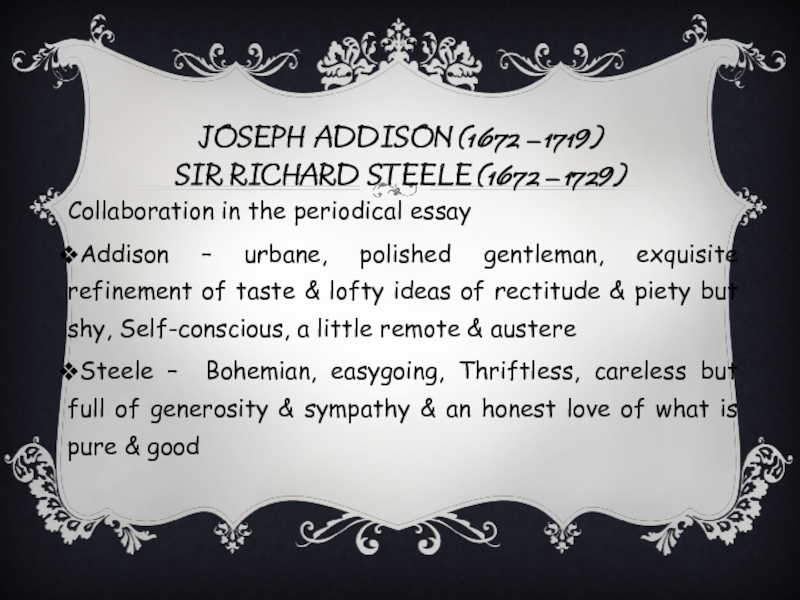
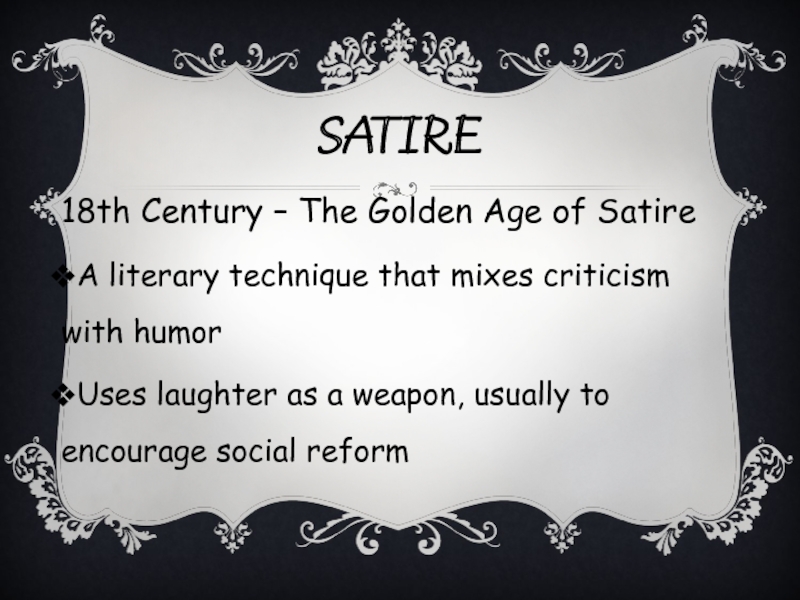
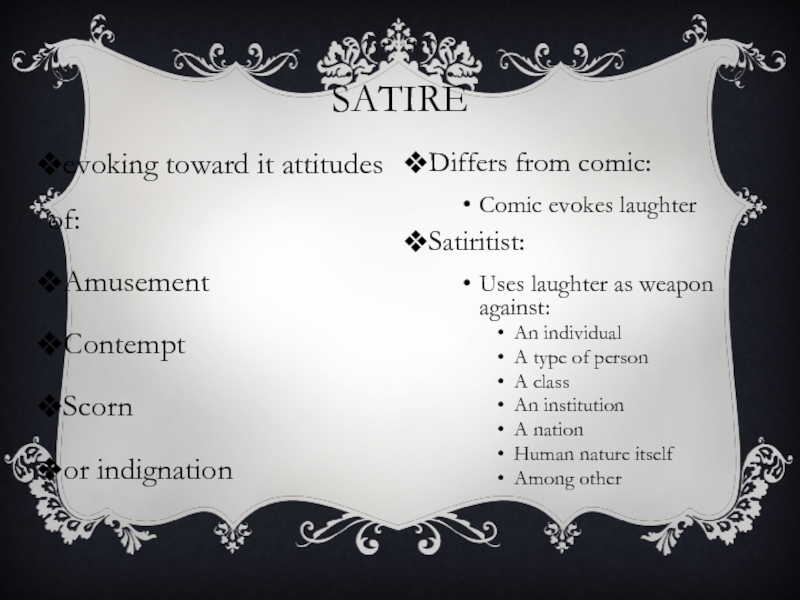
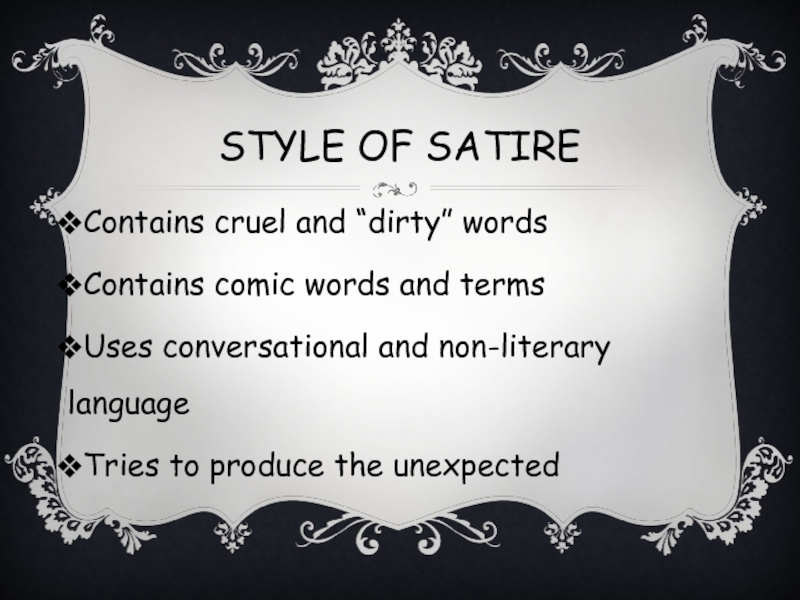
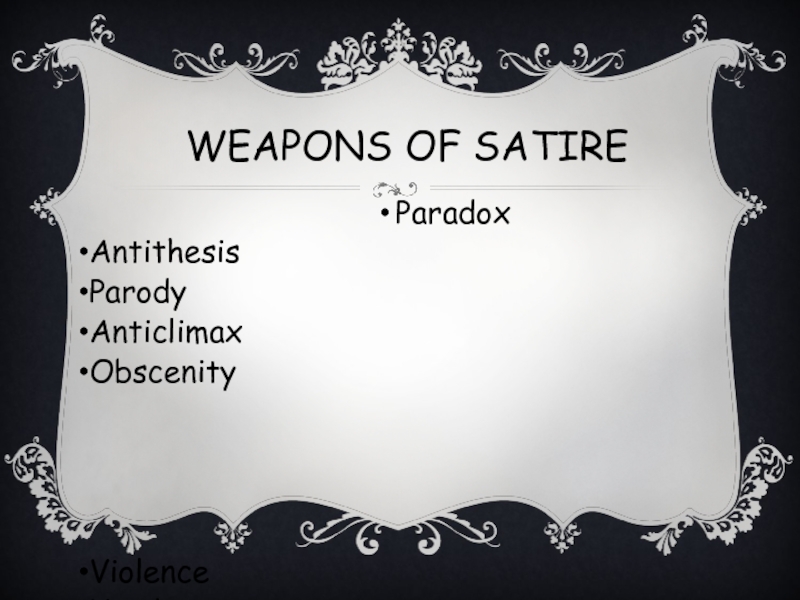
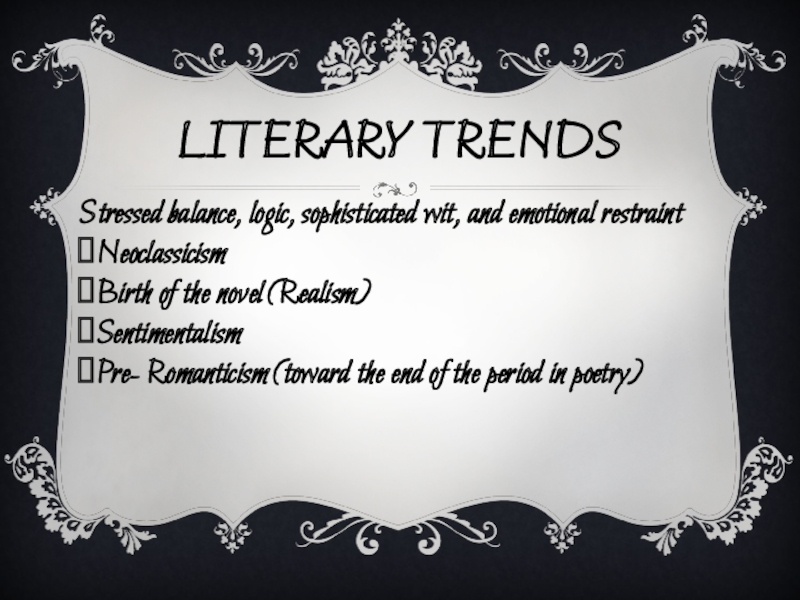
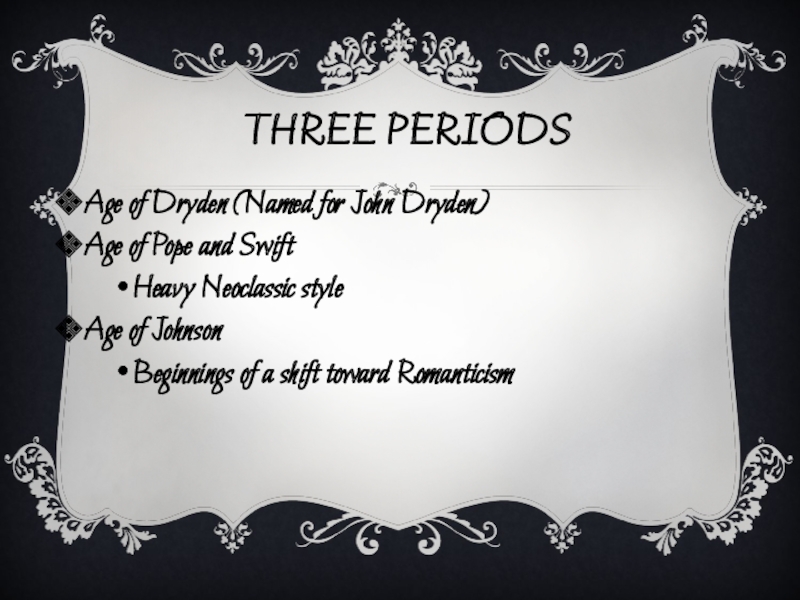
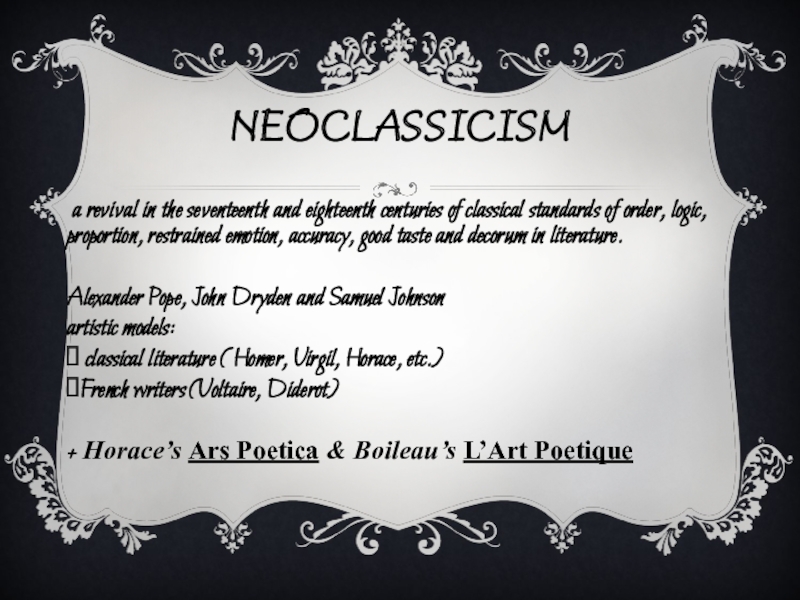
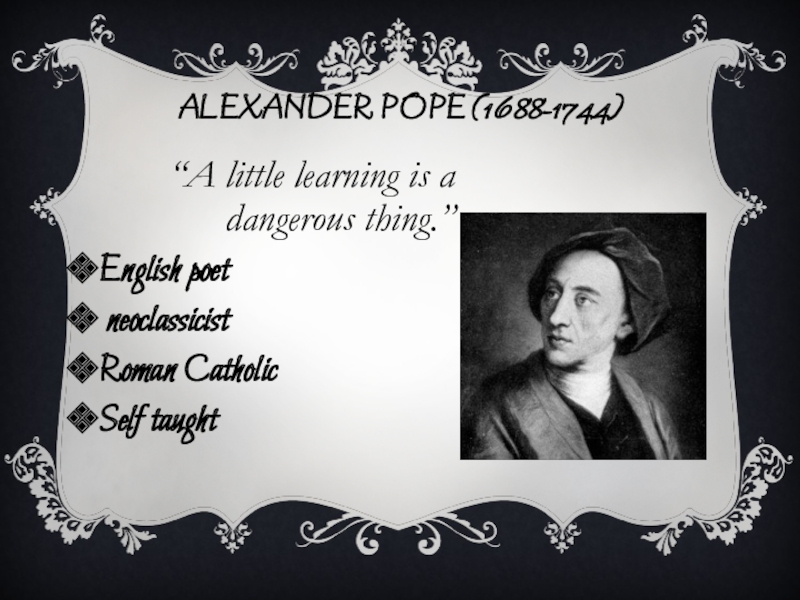
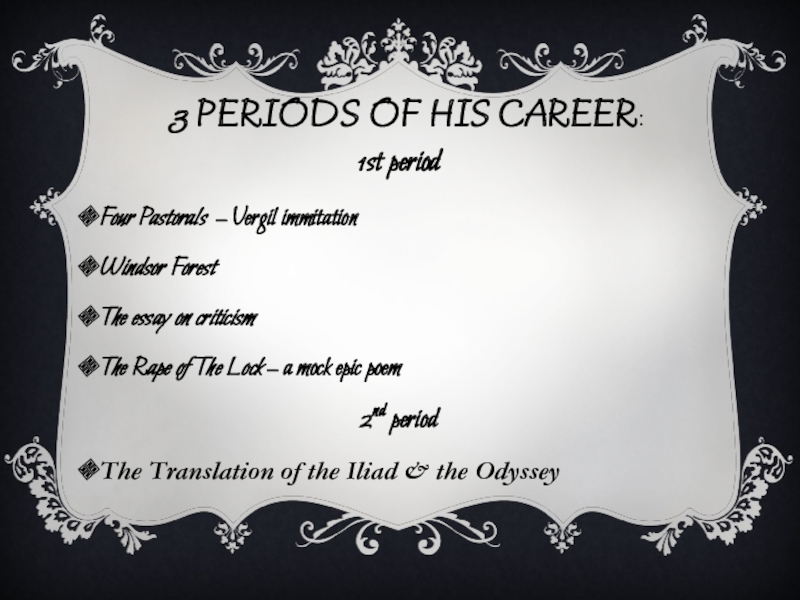
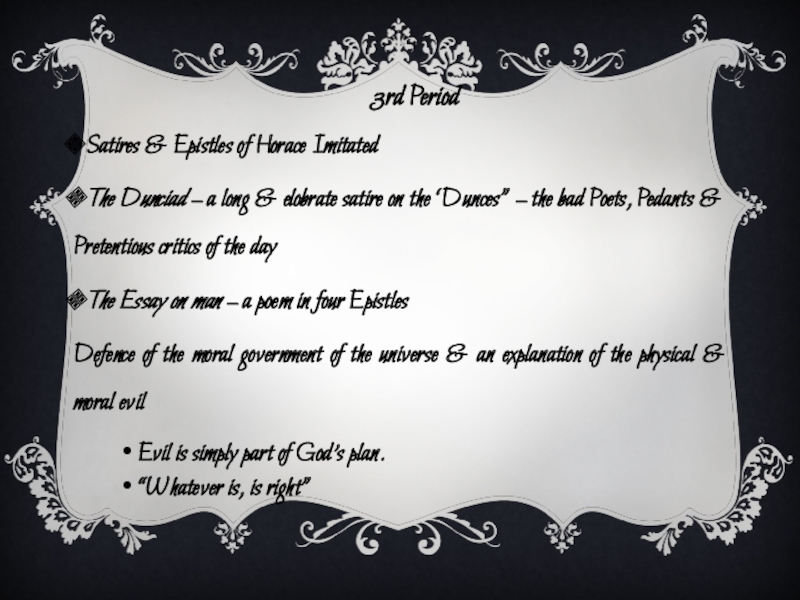
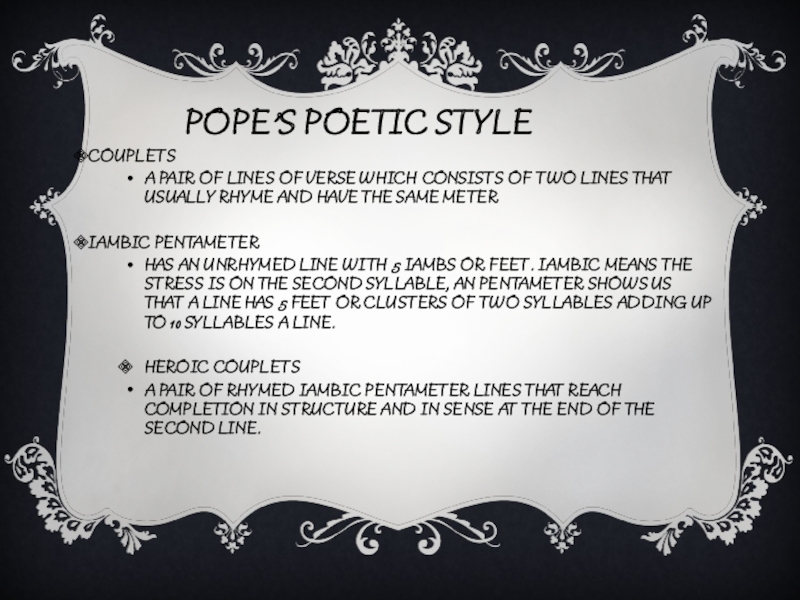
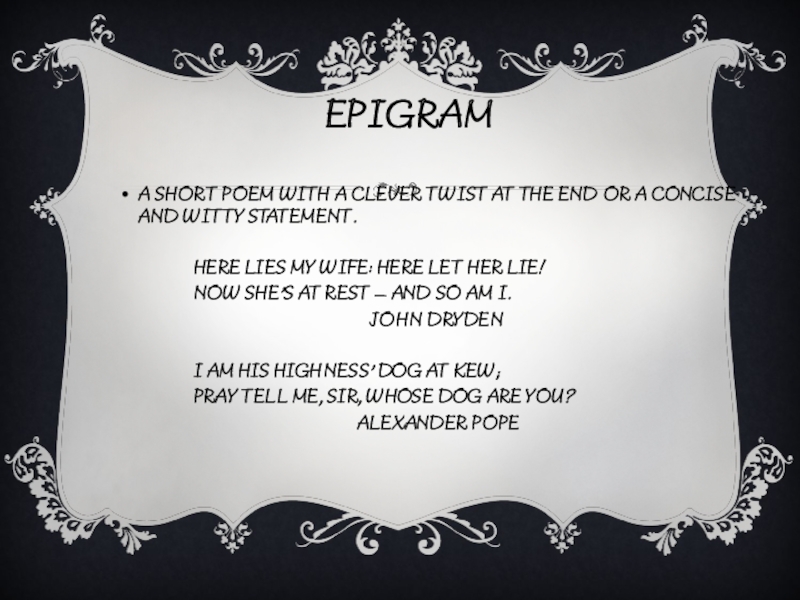
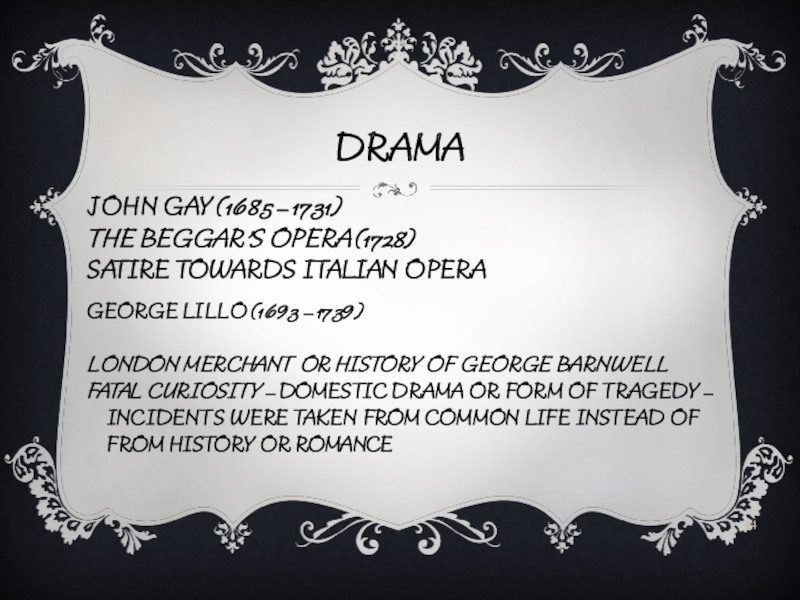
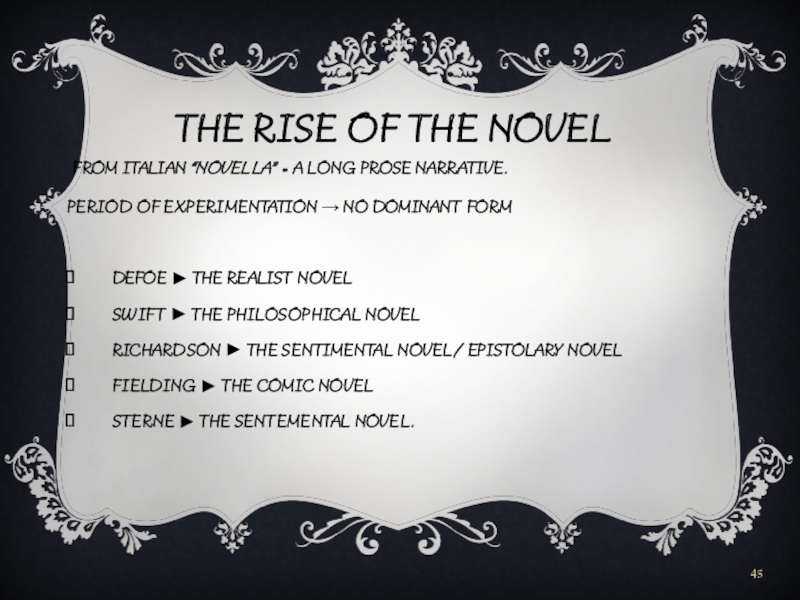
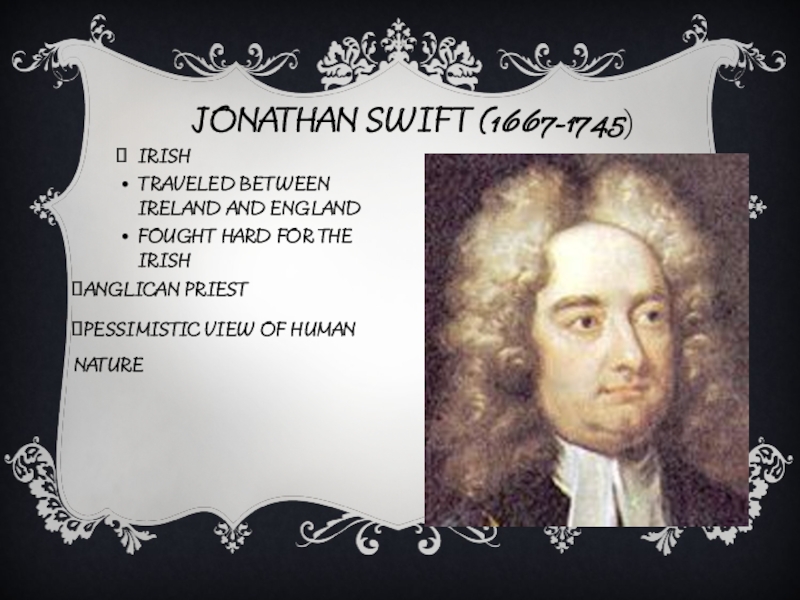
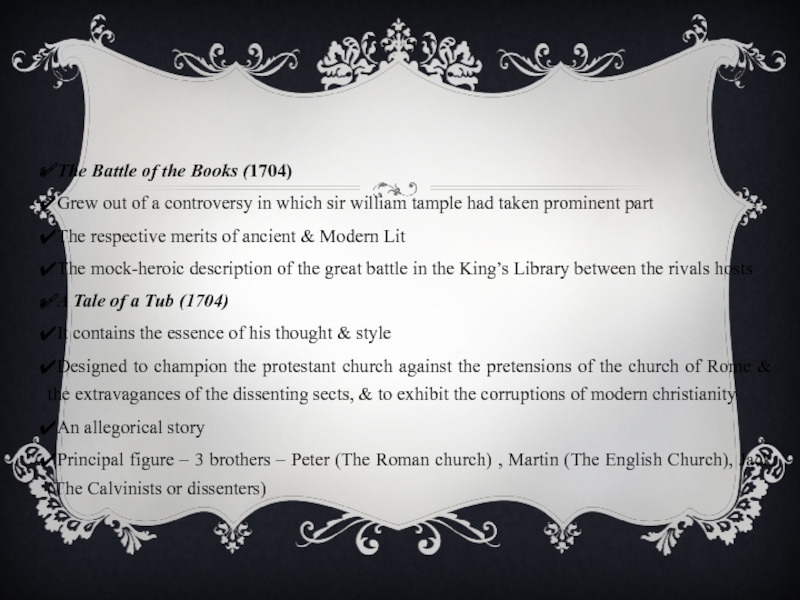
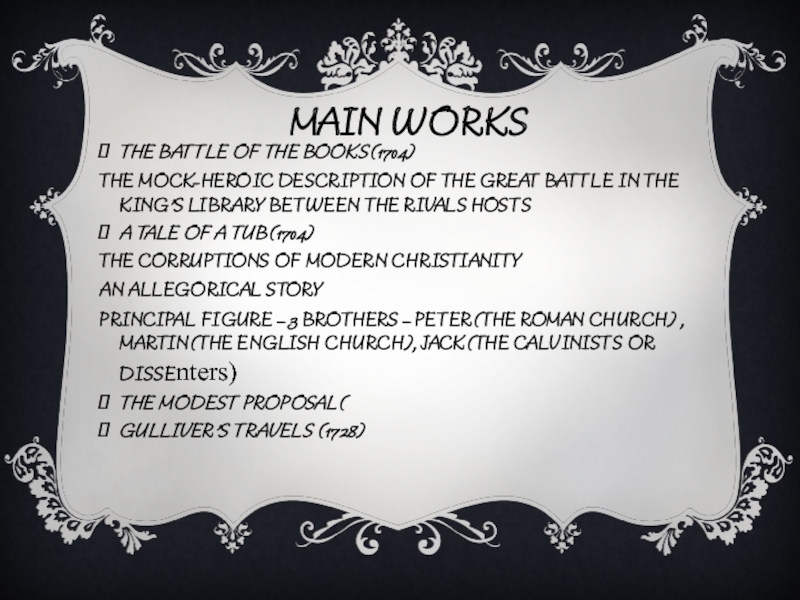
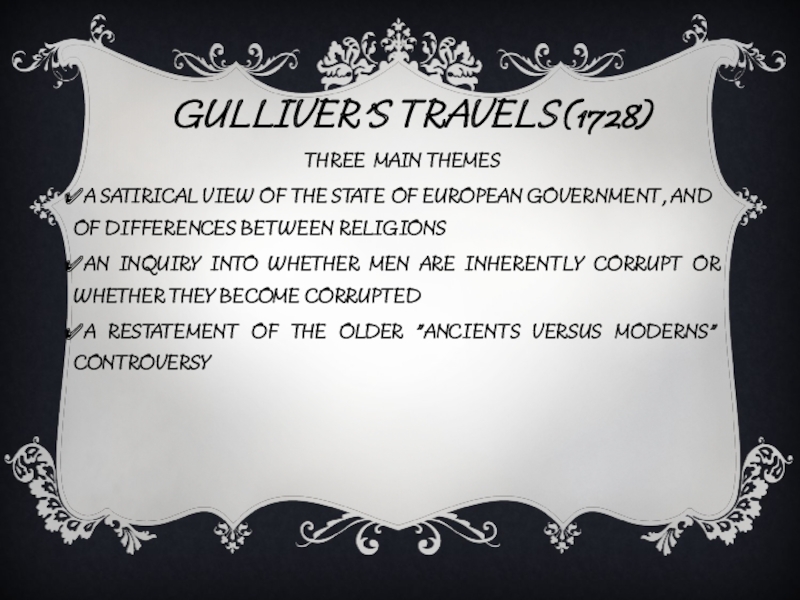
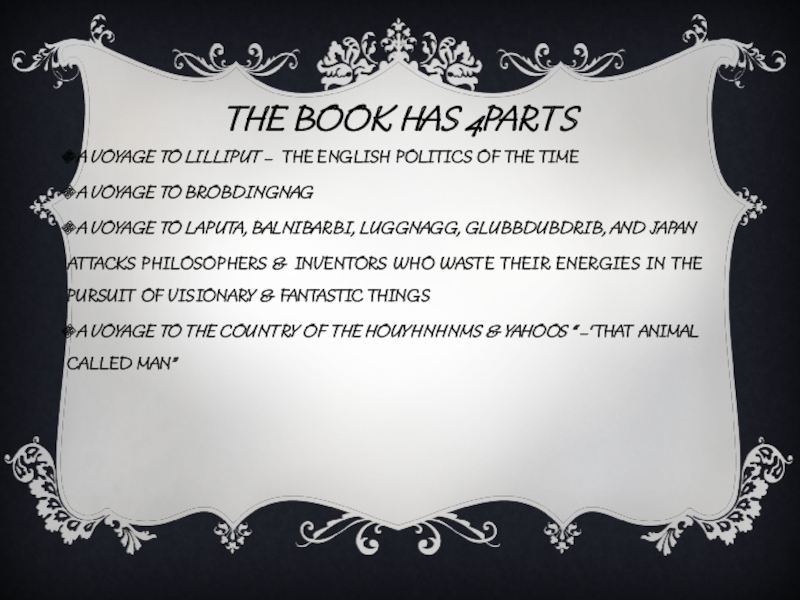
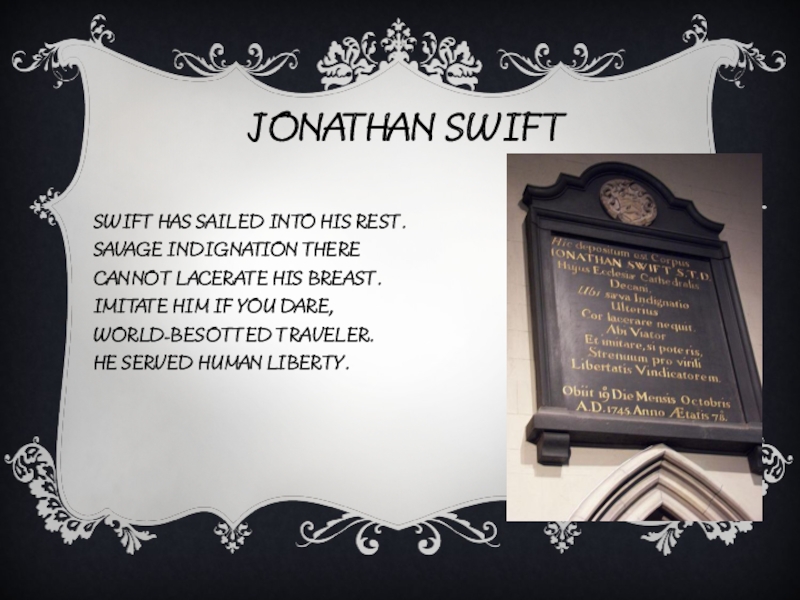
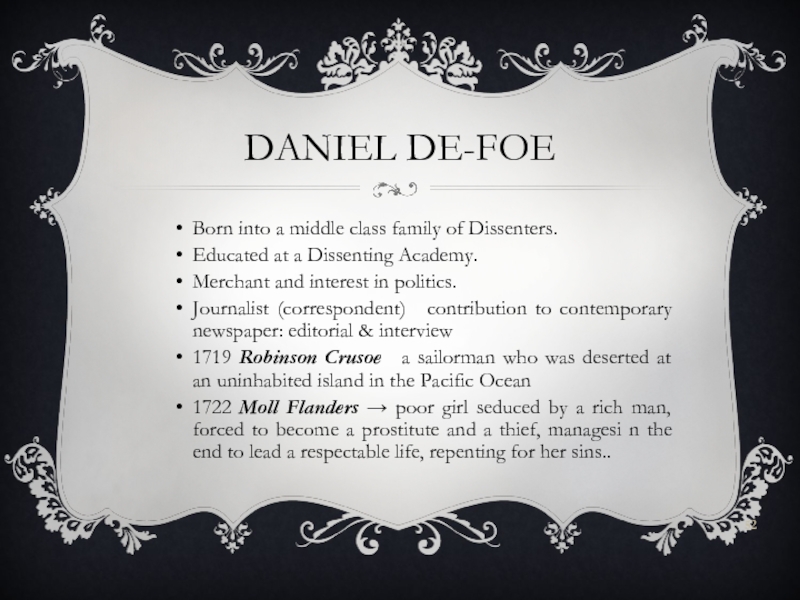
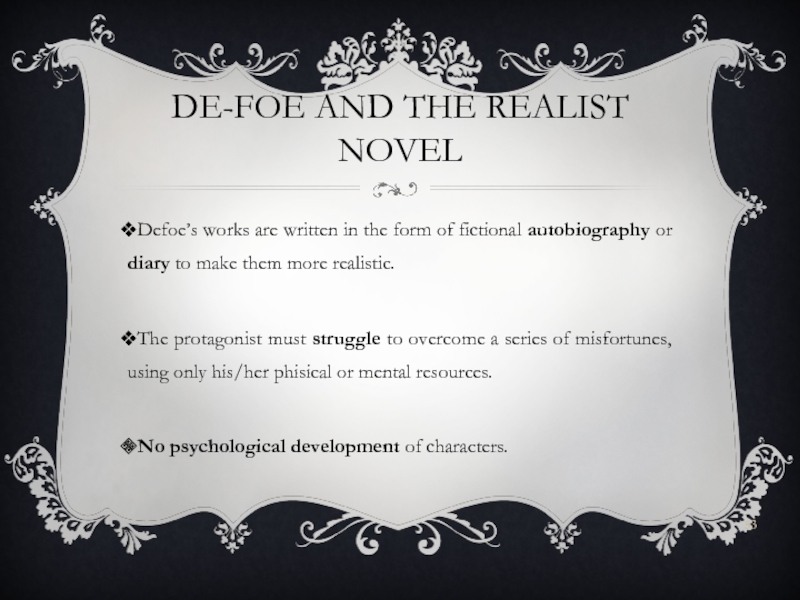
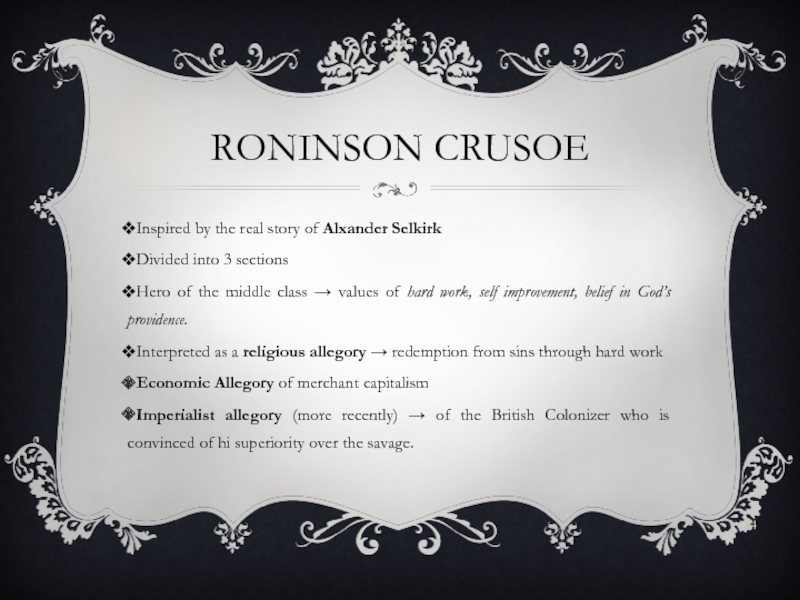
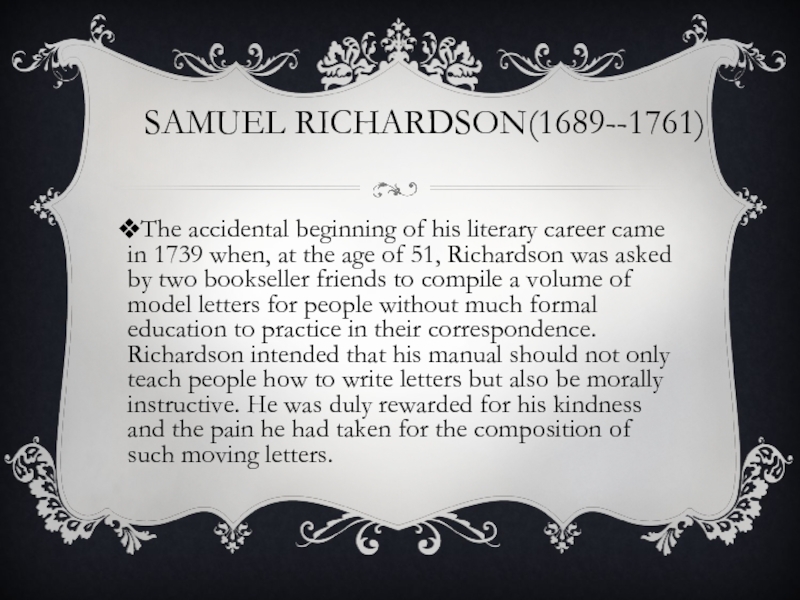
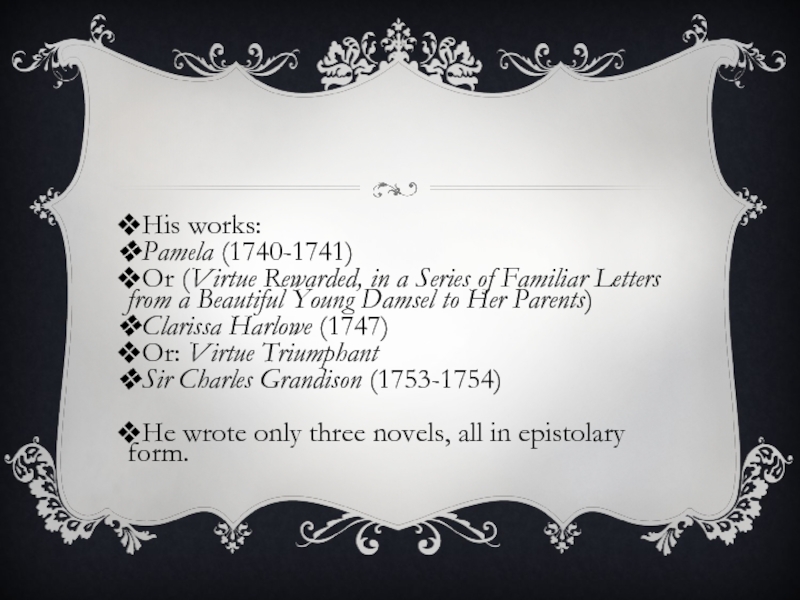
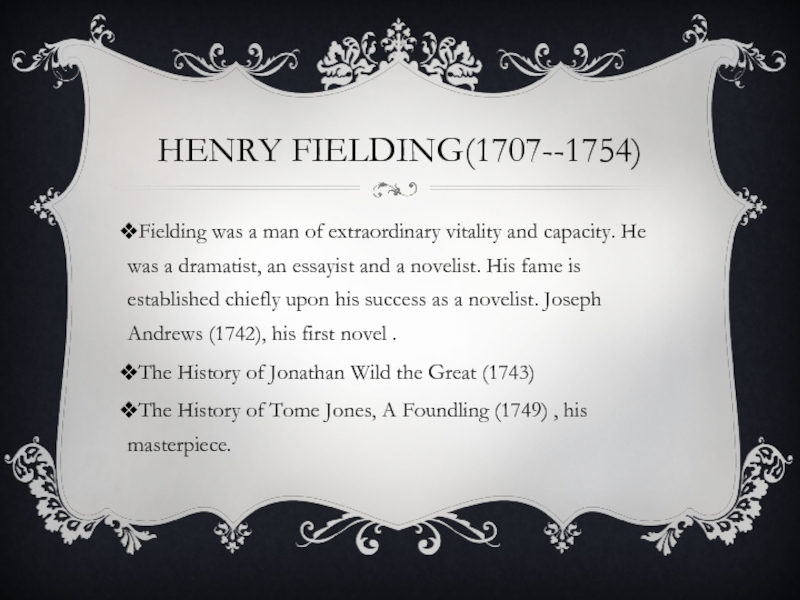
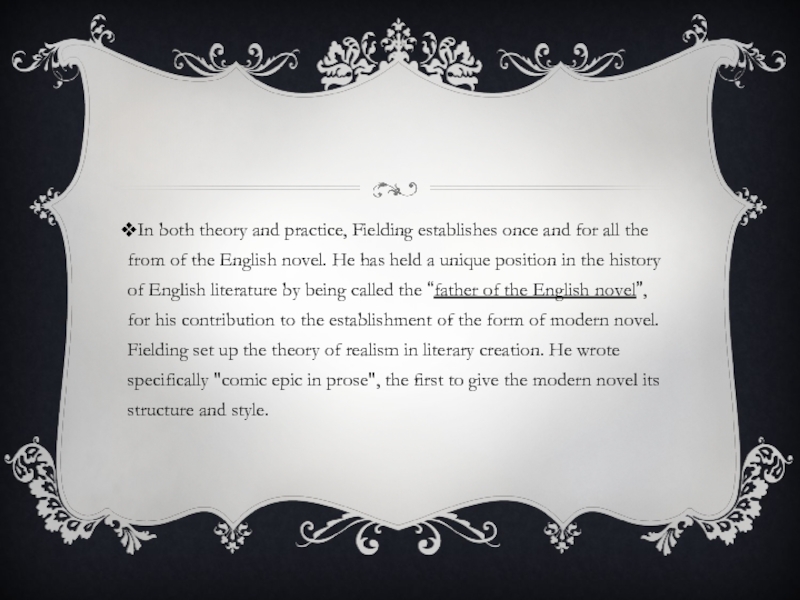
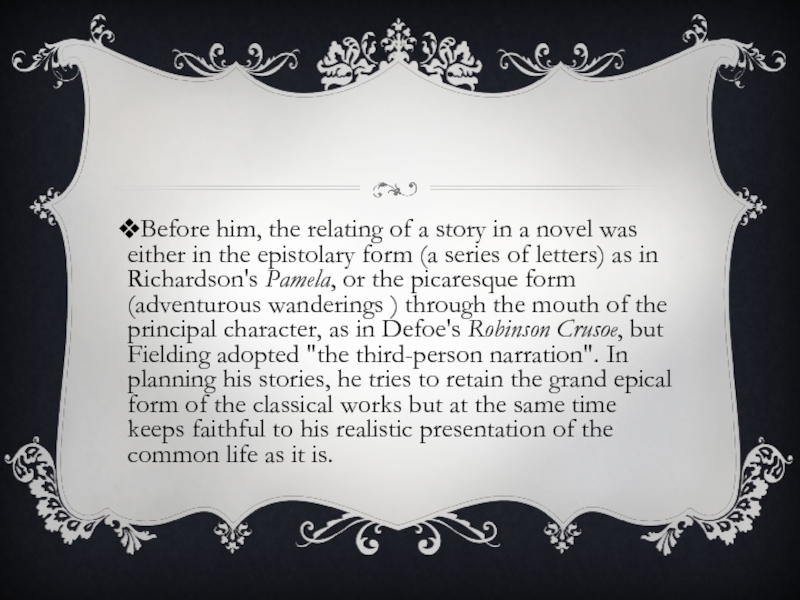
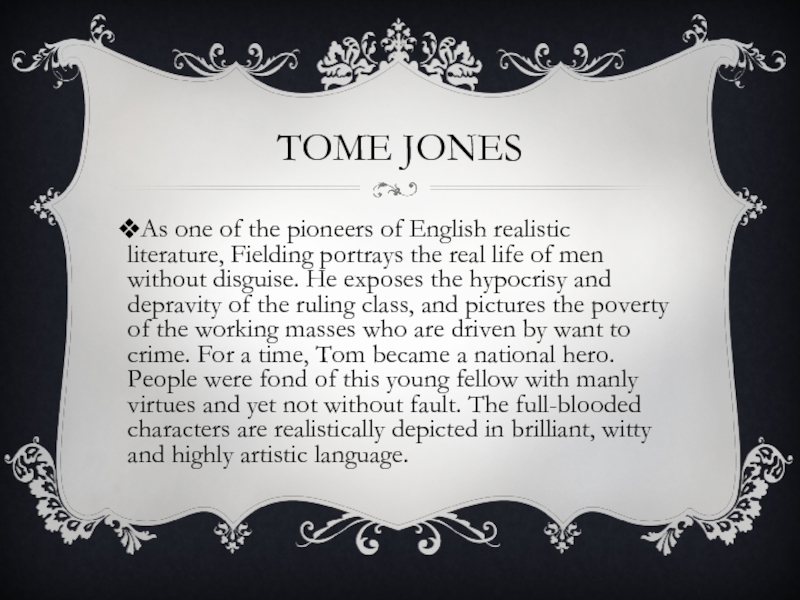
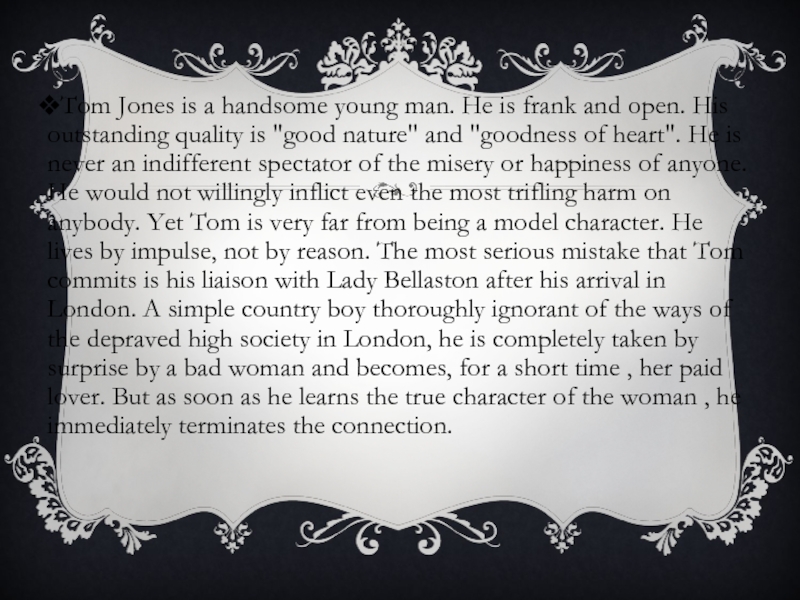
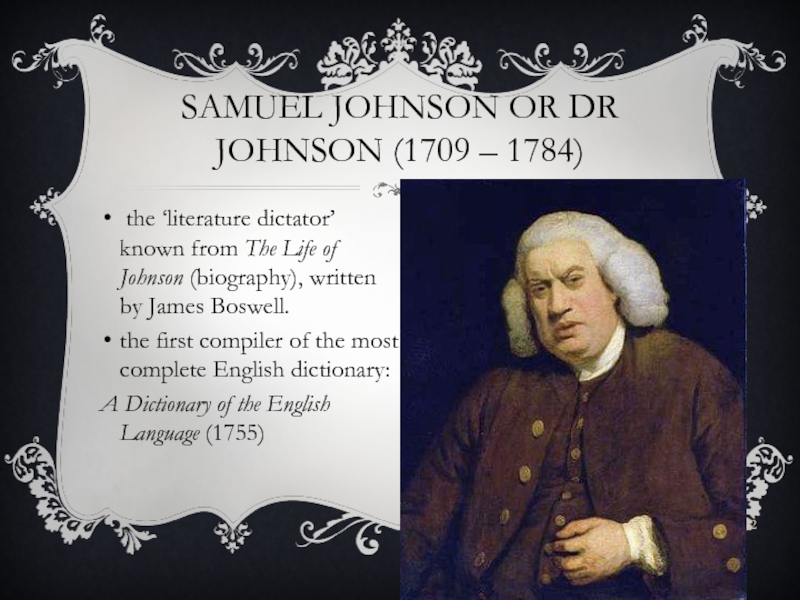
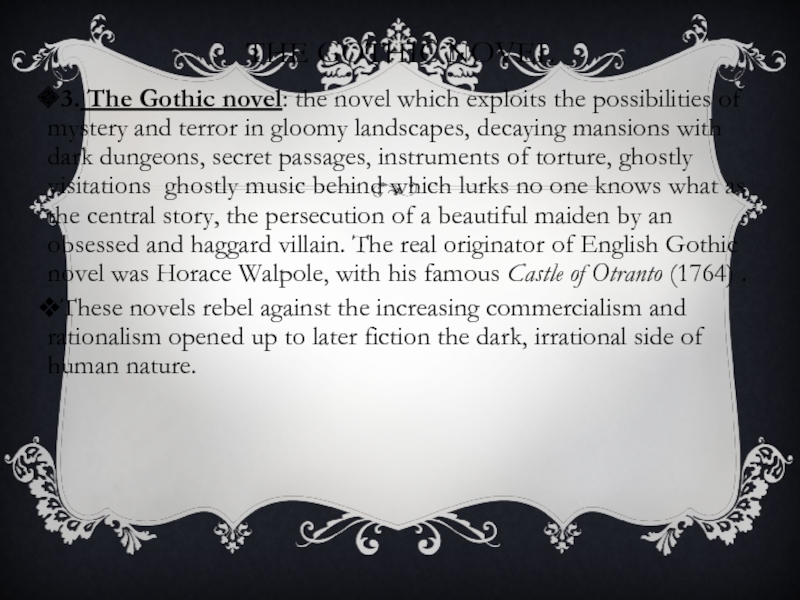
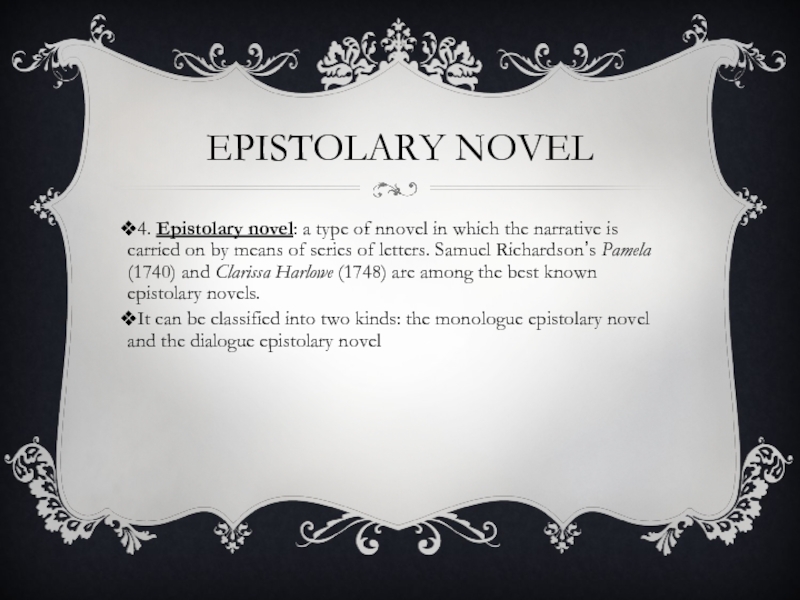
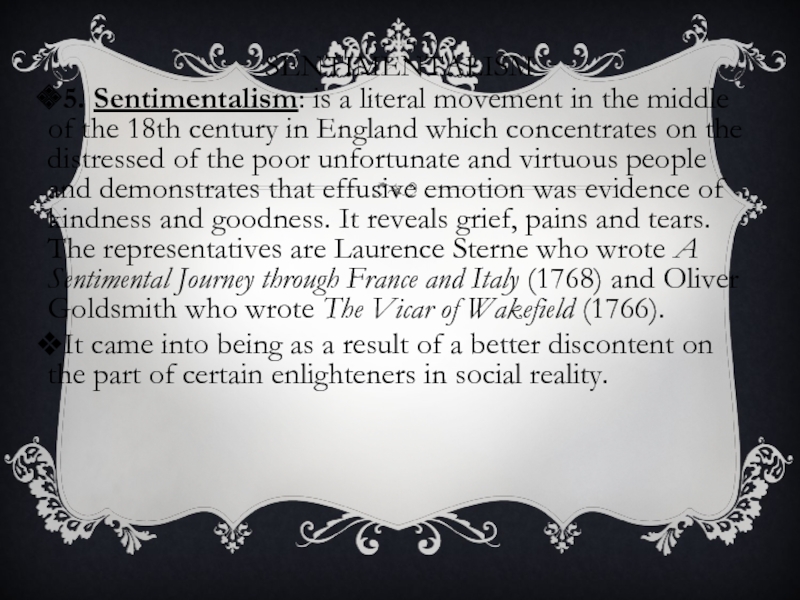
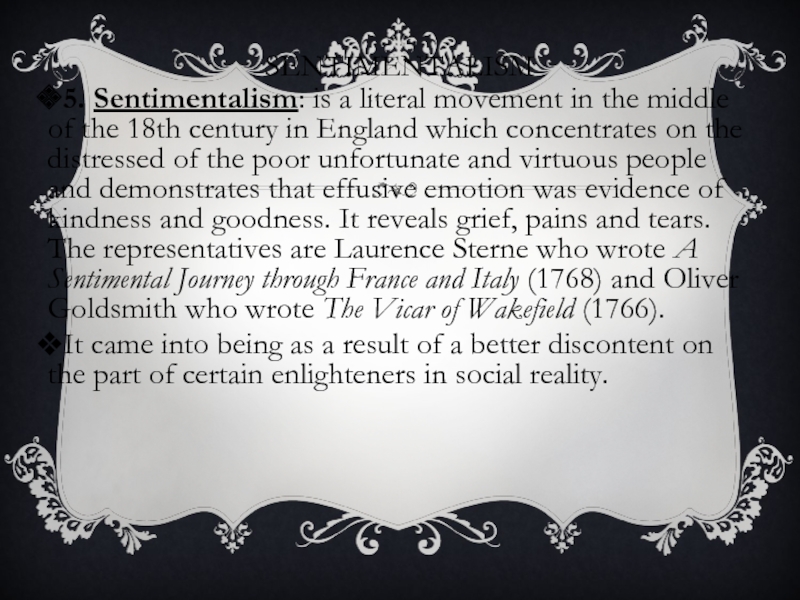
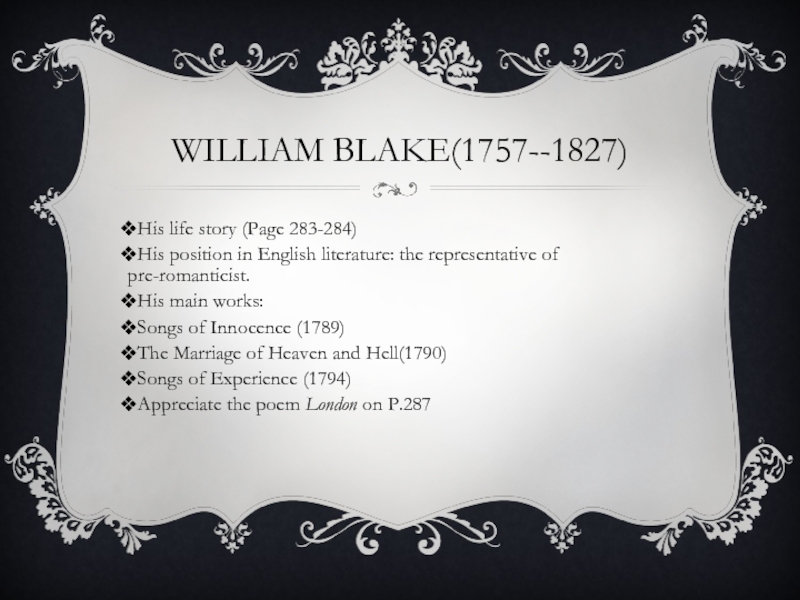
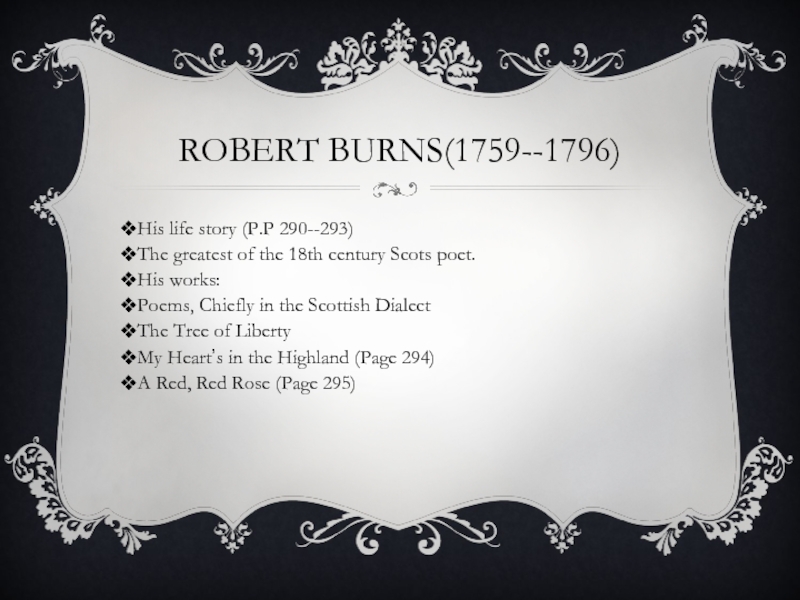



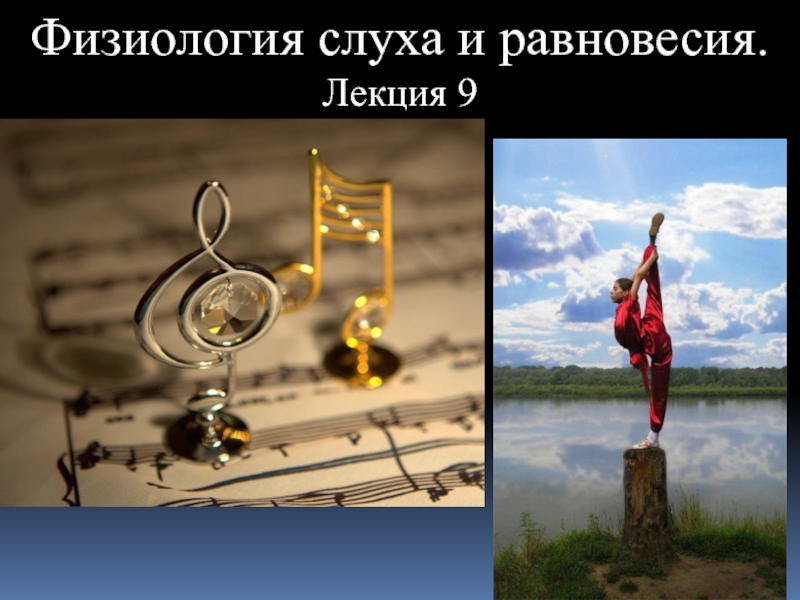



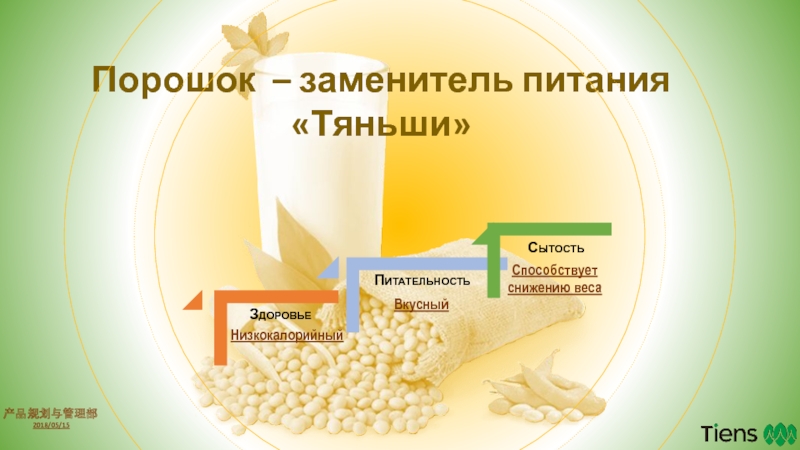

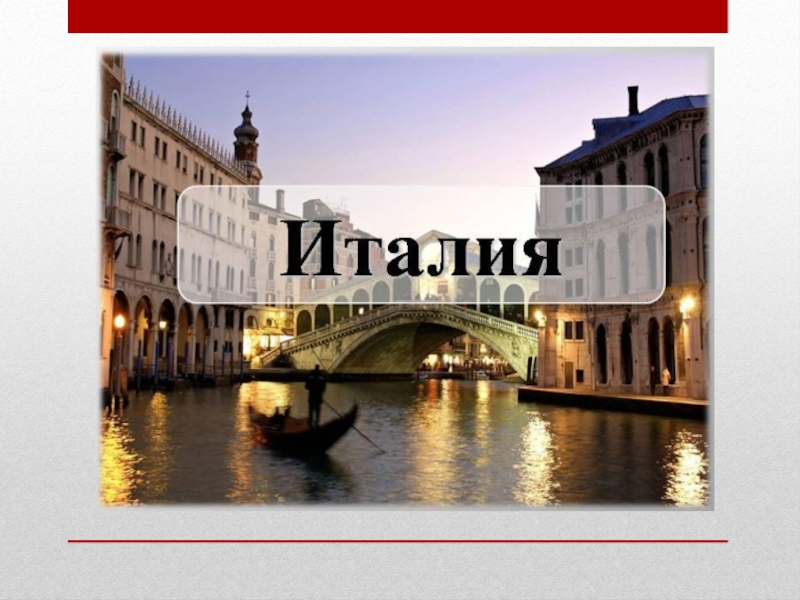
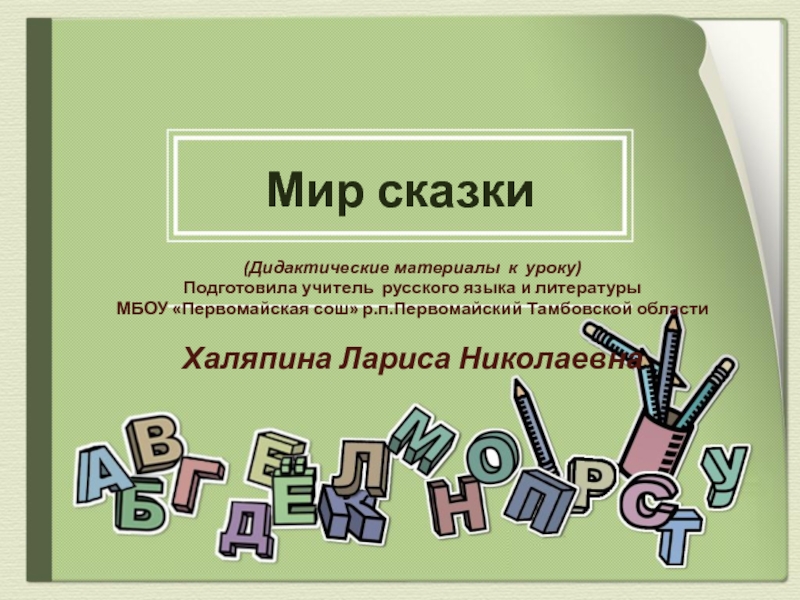


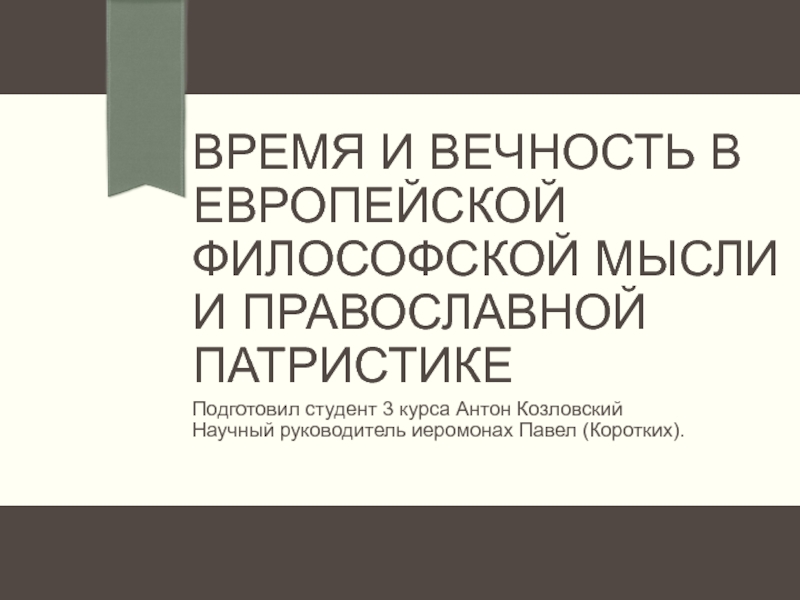

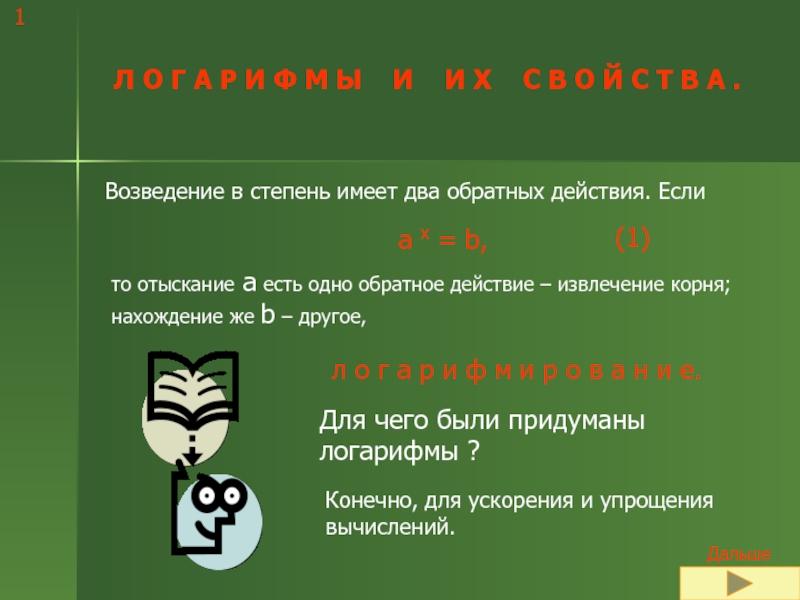


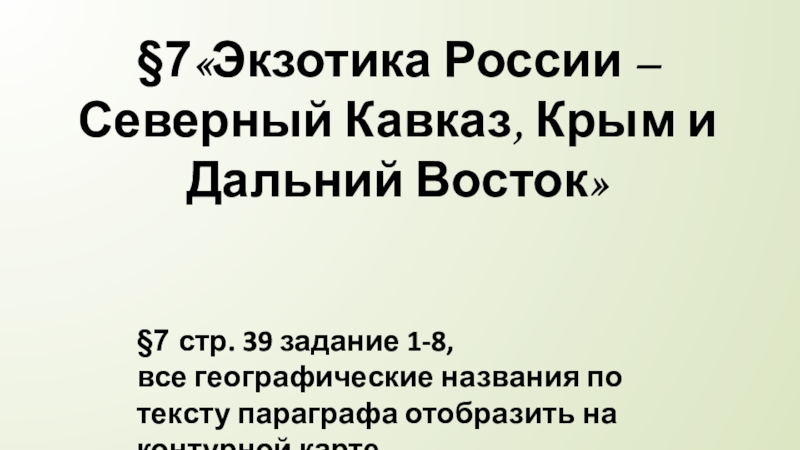
![[ Личный бренд как один из способов продвижения чтения: презентация проекта ]](/img/thumbs/e99feefa36c4c4df7a776e5ba3c5f4f5-800x.jpg)